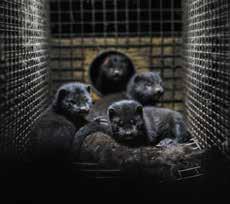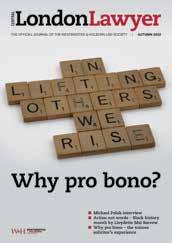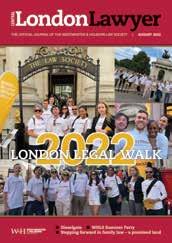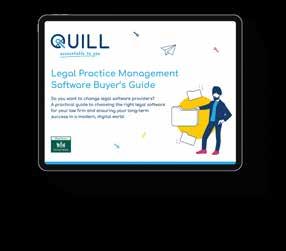
THE OFFICIAL JOURNAL OF THE WESTMINSTER & HOLBORN LAW SOCIETY | WINTER 2023 London CENTRAL � Fur Farming � ESG and nature � Interviewing Animal Advocate –Samuel March Lawyer Why laws for nature are a natural next step


XXXXXXXXXXXX 2 | CENTRAL LONDON LAWYER Don’t change what you do. Just make it easier to do. See how Clio makes legal practice management easier. Discover Clio today at clio.com/uk/central-london or call +44-800-433-2546.
PUBLISHER
Benham Publishing

Aintree Building, Aintree Way, Aintree Business Park, Liverpool L9 5AQ
Tel: 0151 236 4141
Fax: 0151 236 0440

Email: admin@benhampublishing.com
Web: www.benhampublishing.com
ACCOUNTS DIRECTOR
Joanne Casey
SALES MANAGER
Catherine McCarthy
STUDIO MANAGER
Lee Finney
MEDIA No.
1949
PUBLISHED
Winter 2023 © Benham Publishing Ltd.
LEGAL NOTICE
© Benham Publishing.
None of the editorial or photographs may be reproduced without prior written permission from the publishers. Benham Publishing would like to point out that all editorial comment and articles are the responsibility of the originators and may or may not reflect the opinions of Benham Media. No responsibility can be accepted for any inaccuracies that may occur, correct at time of going to press. Benham Publishing cannot be held responsible for any inaccuracies in web or email links supplied to us.
DISCLAIMER
All views expressed in this publication are the views of the individual writers and not the society unless specifically stated to be otherwise. All statements as to the law are for discussion between members and should not be relied upon as an accurate statement of the law, are of a general nature and do not constitute advice in any particular case or circumstance.
Members of the public should not seek to rely on anything published in this magazine in court but seek qualified Legal Advice.
COVER INFORMATION
Photo by Prince David on Unsplash.
Copy Deadline
21st April 2023
For the May 2023 edition
Advertising
Anyone wishing to advertise in Central London Lawyer please contact Catherine McCarthy before the copy deadline. 0151 236 4141
catherine@benhampublishing.com
Editorial
Members wishing to submit editorial please send to: cwhlawsoc@gmail.com
Editor in Chief: Kene Onyeka Allison. Editorial Board: Lotus Kimona, Anamitra Mukhopadhyay and Sadie Thompson & Anita Winsome.
10
05 President’s Foreword
10 3 becoming 1
12 Trading exploitation for conservation through international trade law
13 Protected, but not enough
15 UK finance: Designing a framework fit for a green future

16 The reality of Hong Kong’s Animal Law
18 Writing the final chapter of fur farming in Italy

21 ESG and nature
25 Earth Law

26 You can lead the court to water, but can you make it drink?
32
28 Save the Asian elephants
30 Natural law
32 Interviewing Animal Advocate – Samuel March

CENTRAL LONDON LAWYER | 3
Contents
Follow us on social media
21 18

XXXXXXXXXXXX 4 | CENTRAL LONDON LAWYER How’s the weather looking this working week? Cloudy, but brighter with MyQuill. Quill’s cloud-based legal software is chock-full of new and improved features, giving you everything your law firm needs to manage your cases, contacts, and bills in just a few clicks. The result? A clear workflow, and a clearer head, no matter the weather. SCHEDULE A DEMO TODAY! 0161 236 2910 sales@quill.co.uk quill.co.uk MONDAY TUESDAY WEDNESDAY THURSDAY FRIDAY
The President’s Foreword
WINTER 2023
Nicola Rubbert
Dear Member, I hope that 2023 is going well for you so far. Although this is our winter edition, the feeling of spring is definitely in the air, a season which brings us a renewed appreciation for nature. This feeling happily ties in with this issue’s focus on laws impacting the natural world. Thank you to Riley Forson, this edition’s guest editor and to Kene Onyeka Allison, Lotus Kimona, the rest of the Editorial Board and our contributors for producing this brilliant magazine. We hope you enjoy reading it.
The longer, brighter days are also bringing Westminster & Holborn Law Society’s committee members energy and enthusiasm for arranging and hosting some exciting events. Our next event will be on Thursday 16 March 2023 to mark International Women’s Day. It will be held at the University Women’s Club in Mayfair. Further details can be found on our website. Other events are in the pipeline but if there is a particular event you’d like to see, please let me know.
We have identified a number of vacancies on our committees to help us become bigger and better. Perhaps this is the year that you want to get more involved with your local law society? Joining one of our committees is not only social and rewarding but also helps improve and develop a variety of skills.
Our membership fees are now at a reduced rate for anyone on maternity leave, shared parental leave or adoption leave. Please contact our administrator for more information. If there are any other changes you think we could make to be more inclusive, please let me know.
I look forward to seeing you at an event soon. �
Nicola Rubbert President Westminster & Holborn Law Society
I am very grateful to have been invited to guest edit this winter edition and to focus it on laws impacting the natural world and biodiversity, which are increasingly important given our increased understanding of the sentience of animals and the importance of the natural world in maintaining a healthy planetary system. The issues impacting nature and animals are global in nature and I am grateful to those who have contributed legal perspectives from around the world for this issue. �
Riley Forson Guest Editor Trainee Solicitor, Macfarlanes LLP









SPONSORS

CENTRAL LONDON LAWYER | 5 INTRODUCTION
Nicola Rubbert President
Nicola is looking forward to the year ahead as President of Westminster & Holborn Law Society. Nicola is a commercial and employment solicitor. Nicola is a Council Member of The Law Society of England & Wales, representing the constituency of Westminster. Nicola is a former Chair of WHLS’s Education & Training Committee and still sits on the committee, and is a former Chair of London Young Lawyers Group.
Philip Henson Vice President
Philip Henson is a Partner and the Head of Employment at international law firm EBL Miller Rosenfalck, based in Farringdon. He also heads the North America desk and the China desk of the firm. He is the Chair of the WHLS Law Reform Committee. Phil and the committee research and reply to consultations on changes to legislation. Phil is looking forward to being more involved in the Society as the Deputy Vice President. Phil is involved in various charities and he is the Editor of City Solicitor magazine (the magazine of the City of London Law Society). Outside of a busy work and family life, Phil also produces and occasionally writes short films. He has recently finished a script for a dark comedy called Viking Funeral which he plans to develop in 2022.
Nicola Wainwright Deputy Vice President


Nicola Wainwright is a specialist clinical negligence solicitor with more than 20 years’ experience. She is a Partner and Head of Clinical Negligence-London at JMW Solicitors LLP. Nicola specialises exclusively in clinical negligence claims for patients arising from medical treatment that has gone wrong, or from a failure to provide medical treatment. She has expertise in a wide range of claims, but particularly those that are complex or that result in severe, life changing injuries. Nicola has been ranked in Chambers & Partners legal directory for 14 years and has been described as a ‘highly experienced lawyer who achieves great results’ for clients. Clients describe her as ‘incredibly empathetic and understanding’ and as ‘having great communication skills’. Nicola qualified as a solicitor in 1997 after training with Pictons. She specialised in personal injury and clinical negligence at Davies & Partners, Birmingham before joining Leigh Day in 2000, since when she has specialised exclusively in clinical negligence. She was at Leigh Day for 20 years before joining JMW. Nicola is a member of the Law Society Clinical Negligence Accreditation Panel and an Association of Personal Injury (APIL) Senior Litigator. Nicola sits on the Westminster & Holborn Law Society CSR and Pro-Bono Committee. She is also a member of FOCIS (Forum of Complex Injury Solicitors), and the Association of Women Solicitors, London (AWSL).
Kene Onyeka Allison Editor in Chief
Kene is an in-house solicitor at Mizuho International plc, a Japanese investment bank. She is dual-qualified in England & Wales and Nigeria. Her areas of specialisation are Debt Capital Markets and Derivatives. She is the co-chair of the British Nigeria Law Forum Women’s Network and volunteers in different capacities with different organisations with the aim of improving ethnic and minority diversity.

Luke Silverman Administrative Secretary

Luke is a Trainee Solicitor at Macfarlanes LLP and the current Administrative Secretary to the Westminster and Holborn Law Society. Luke has a particular interest in matters concerning cryptocurrency as well as how the legal industry can become more Green. In his spare time, Luke is a keen cyclist and can be found speeding around Regent’s Park in the early hours of the day.
Matthew Allan Immediate Past President

Matthew is a solicitor-advocate at Greenwoods specialising in commercial litigation and international arbitration. He is also the Vice Chair of the Society’s International Committee which develops professional links with lawyers and their clients throughout Europe and further afield, with a particular focus on his native Canada. As the Immediate Past President of the Society, Matt’s priority is to continue his efforts growing the commercial connections with our twinned bar associations.

6 | CENTRAL LONDON LAWYER WHLS OFFICERS
Kene Onyeka Allison

Kene is an in-house solicitor at Mizuho International plc, a Japanese investment bank. She is dual-qualified in England & Wales and Nigeria. Her areas of specialisation are Debt Capital Markets and Derivatives. She is the co-chair of the British Nigeria Law Forum Women’s Network and volunteers in different capacities with different organisations with the aim of improving ethnic and minority diversity.


Sarah Bradd
Sarah is a Paralegal and a Future Trainee at Charles Russell Speechlys working for the Development Sales and Regeneration Teams. She is currently working towards completing her Fellowship for CILEx having completed her LLB at the University of Law. She is looking forward to starting her Training Contract in 2023. Sarah enjoys spending time on holiday exploring new places. When not working, she loves eating at restaurants and going to the cinema.
Lotus Kimona
Lotus works as a Legal Assistant in the matrimonial department at Hepburn Delaney. She has experience across different areas of commercial law but decided that family law is her preferred specialism. When not working you can find Lotus on a netball court, reading, spending time with family and friends or at her favourite coffee shops.
Anamitra Mukhopadhyay


Anamitra is a solicitor within JMW Solicitors LLP’s Commercial Litigation and IP departments. Anamitra advises clients across various sectors on a variety of matters including IP infringement issues, contractual breaches and civil fraud. Prior to entering the world of law, Anamitra completed a History degree and has a passion for the subject. Aside from History, Anamitra’s other love in life is music. She is a keen singer and enjoys performing.
Sadie Thomson
Sadie is an Associate within the Business Crime and Regulatory department at JMW Solicitors LLP. She advises individuals and companies in respect of various allegations including financial crime, violence, drug and motoring offences. Sadie joined the Manchester office of JMW in 2017, having completed a History degree at the University of York. She transferred to the London office in 2022 and is enjoying all that the city has to offer!



Anita Winsome

Anita is an LLM student specialising in Comparative & International Dispute Resolution at Queen Mary University of London. Her interests include domestic & international arbitration, competition law and intellectual property rights. She is a qualified lawyer in India and is a licensed member of the Bar Council. Her favourite pastime activity includes exploring the beautiful cafes, museums or the parks at South Kensington.

CENTRAL LONDON LAWYER | 7 WHLS EDITORIAL TEAM
To advertise in Central London Lawyer, please call Catherine McCarthy our Business Features Editor on 0151 236 4141 or email catherine@benhampublishing.com Want to feature in Central London Lawyer?
Publicity & Social Media Committee update
Returning fresh into the new year after a very busy Christmas period, we hope everyone is now geared up and ready to start networking again. The Westminster and Holborn Law Society are grateful for all the support of our members, sponsors and wider network throughout 2022 and look forward to 2023 to continually bolster these relationships.
To offer a brief reminder of what WHLS has been up to in the last quarter of 2022, we hosted and collaborated on a few events that were well attended by members and prospective members alike.
Past events
� In October, we welcomed our new President, Nicola Rubbert and said goodbye to our now Immediate Past President, Matthew Allan! We are truly grateful to Matt for his hard work and dedication throughout his tenure and wish Nicola the very best.
� On 1 November, we collaborated with the American Bar Association (ABA) to present – ‘Avoiding a Pyrrhic Victory: Enforcing Awards and Judgment in the UK and US’ on crossborder enforcement of litigation judgements and arbitration awards focusing on UK and USA.
� We also hosted our Annual Dinner at the National Liberal Club on 10 November. This was well attended as it is one of, if not, the biggest event on our calendar. A massive thank you to all who attended and to those who were not able to attend, here’s hoping that you are already looking forward to the 2023 edition.
� We were hoping to host a social evening in November at the Old Bank of England pub, however, we regrettably had to cancel due to reasons beyond our control. We look forward socializing with you sometime soon.
Upcoming events
� We look forward to hosting 'Navigating Qualification and Beyond', an event for second year trainees and NQs in conjunction with London Young Lawyers Group on 16 February at the Dawson Cornwell offices. This exciting event will be an amazing platform for early-stage legal professionals to build their network and take advice on career progression from an exceptional list of panellists.
You can find more information about our upcoming events on our social media platforms!
To wrap up, we would like to encourage interaction and engagement with our content on social media, where we encourage positive and healthy discussions on our posts in general. We also look forward to welcoming new members to our society, so get in touch on any of our social media pages or with anyone of our committee members, as we will then be able to discuss how you too could become a member of Westminster and Holborn Law Society. �
The Westminster & Holborn Law Society is a vibrant, diverse and welcoming organisation representing around 20,000 solicitors across Westminster, Holborn and Central London. We have links with regional and international legal organisations and are part of the Fédération des Barreaux d’Europe. We are also twinned with the Paris, Berlin, Milan and Barcelona bar associations, among others. Attending our events offers you the opportunity to network with other legal professionals from across London, Europe and internationally in a relaxing atmosphere.
Corporate Membership
If your firm would like to learn more about our corporate membership benefits, please contact Membership Committee Chair Joanne Skolnick via email at cwhls@gmail.com
Reasons to Join
� Fabulous social and professional development events. Some recent social event highlights include a reception at the House of Lords and annual black-tie dinner at the National Liberal Club.
� Professional development events helping you to hone your legal skills and knowledge. Most of our events are free for members and a great opportunity to meet other legal professionals.
� The opportunity to write an article for our quarterly magazine, Central London Lawyer, showcasing your expertise. Subscriptions are free for members.
� The chance to apply for, or nominate a candidate for, the Gamlen Prize or the Rising Star Award.
� To participate in our committees and share your ideas. The Society has several committees offering opportunities to get more involved and to hone your leadership skills.
How to Renew
If your details have not changed, kindly pay the invoice you were sent by email and please provide us with a secondary email address. If you have changed employers or if your status has changed, please let us know so that we can update your details. If you are not yet a member, you can easily join by visiting our website at www.cwhls.org.uk. Just fill out the membership form on the Join Us page and follow the payment instructions.
We look forward to welcoming you to our Society and seeing you at our next event! �
8 | CENTRAL LONDON LAWYER SUB-COMMITTEES
MEMBERSHIP
The return of in-person events meant that the centenary in December 2022 of women entering the profession was celebrated in-person by numerous groups, including Next 100 Years, Legal Women and The Law Society of England and Wales.
Lubna Shuja, President of the Law Society, spoke about the challenges that faced women over the last 100 years and how things have changed. There were excellent stories of women who have blazed a trail in our profession over the years but with recognition of how much more work needs to be done to achieve true parity. Currently, despite over 60% of the profession being women, only 35% of law firm partners are women: a mere 0.3% advance in a decade.
This shows that further initiatives are welcome both by those entering the profession but also by the employers who want to retain staff. Ensuring there are role models, accessing mentoring schemes and introducing sponsorship programmes can all help. Practical changes and policies need to be introduced and followed up within law firms to ensure tangible results. There are easy solutions to this, for example, setting up a women’s network at your firm, joining an external network or joining the Law Society’s Women in Law Pledge.
The Women in Law pledge, launched in partnership with the Bar Council of England and Wales and the Chartered Institute of Legal Executives (CILEx) in June 2019 was created to bring gender equality to the forefront of the conversation.

There is a role for everyone within the legal profession to enact positive change for equality and we encourage all legal service
Equality Diversity and Inclusion Sub-committee
providers, in-house teams and individuals to sign up. You can sign up to the pledge committing to setting high level targets to make a difference for gender equality either within your organisation, or as an advocate, and champion, for change.
What will the pledge do?
By signing up for the pledge, you or your organisation is committing to:
1. supporting the progression of women into senior roles in the profession by focusing on retention and promotion opportunities.
2. setting clear plans and targets around gender equality and diversity for your organisation.
Women in Law Pledge | The Law Society
These do not have to be policies or practices you currently have in place but should include those that you wish to implement. There is a lot of guidance on the website and assistance over the phone. Once you are signed up as an organisation there is support.
www.lawsociety.org.uk/campaigns/women-in-leadership-inlaw/tools/the-women-in-law-pledge
Equality benefits us all; societies with greater gender equality are more connected, people are healthier, have better wellbeing and increased GDP. International Women’s Day will be marked by the committee and we will notify members once we have confirmed the details.
If anyone is interested in joining the EDI Committee please contact Coral@LegalWomen.org.UK �
CENTRAL LONDON LAWYER | 9 SUB-COMMITTEES
Lubna Shuja
3 becoming 1 – the formula to save life on Earth

Humans are not almighty. That is one of the greatest lessons we learned from the COVID-19 outbreak. Despite humankind’s many accomplishments, no cutting edge technology or trailblazing scientific research prevented us from suffering the drastic consequences of the global spillover of an unknown virus.
We did eventually manage to control the situation, but that did not happen before a wide spread economic recession and millions of deaths. That aftermath cannot be considered a victory. Even though humanity has been afflicted by different pandemics and epidemics, many of them were never eradicated. They come and go seasonally, causing considerable damage and this is not the end,different pathogens will continue to appear. Antimicrobial resistance caused by abusive use of antibiotics will progressively create stronger and harder to treat pathogens. In other words: although we might have won this battle, if things continue as they are, there is a war yet to come.
While there is still debate on the origins of the COVID-19 spillover, leading health organisations agree in on one point: it derived from human-animal contact.1 COVID-19 is a zoonosis, “an infectious disease that jumped from a non-human animal to humans2”, according to the World Health Organization (WHO). Indeed, interactions between humans and animals have been happening since the beginning of civilisation. But the fact that today 3 out of every 4 new emerging infectious diseases in people come from animals3 indicates that something has changed...What changed was the kind and intensity of those interactions.
Technological advances changed our relationship with animals. Animal farming became factory farming, a model that concentrates hundreds to thousands of animals in one confined location where they are raised for meat, dairy and eggs. Conglomerating many animals facilitates the spread of diseases, not only because of closeness, but also due to the compromising of their immune system, caused by stress. To control those diseases, the livestock industry makes abundant use of antibiotics, in response to which bacteria change. “Bacteria, not humans or animals, become antibiotic-resistant4”, as WHO points out.
10 | CENTRAL LONDON LAWYER
ARTICLE
More animals raised for food means more emission of pollutants to the atmosphere. In a 2020 article, The Guardian stated that the “EU’s farmed animals ‘produce more emissions than cars and vans combined’5”. While contributing to climate change, industrial animal agriculture is itself contributing to the rising temperatures, which facilitate the spread of pathogens. Factory farming is, thus, a cauldron of disease that threatens humans, animals and the environment.
The solution is simple but not easy: we must change the way we see animals and the environment. So far, humans have been exploiting other beings and natural resources as if they were something different from us. Their commoditisation is openly institutionalised in our policies and laws. Humans, animals and the environment are not only the sources of all life on Earth; they are codependent source of all life on Earth. That relationship, that should be balanced, has been profoundly disrupted by human predominance. If humans do not realise that we are one with both animals and the environment, natural disasters and pandemics are going to continue happening and will become more often and harsher – until there is no life left to be affected.
The importance of that interconnection was translated into ‘One Health’, “an integrated, unifying approach to balance and optimise the health of people, animals and the environment 6”, under WHO’s definition. After the COVID-19 pandemic, the initiative has spread across different sectors at the local, national, regional and global level. One Health is an invitation for governments, researchers, and other workers to prevent, predict, detect, and respond to global health threats. Food and Agriculture Organization of the United Nations (FAO), the United Nations Environment Program (UNEP) and the World Organization for Animal Health (WOAH) are also working with WHO on this endeavor.
Pandemics do not recognise territory borders. As a global call, One Health requires a global compromise. For many reasons, the International Health Regulations, approved in 1969 and last reviewed in 20057, have proved inefficient. The current crises calls for a brand new instrument, one that emphasizes the values praised by One Health.
The movement for “Global Pandemic Treaty” was launched by WHO in 2021; negotiations of that treaty are already happening. During its second meeting in July 2022, the Intergovernmental Negotiating Body 8 worked on a working draft (document A/ INB/2/3 9) that reaffirms the importance of a One Health approach to prevent, prepare and/or respond to pandemics.
Another interesting initiative is the “Convention on Animal Protection” (CAP)10, a draft treaty prepared by a team of practicing lawyers and legal academics in international law and animal law called “International Coalition for Animal Protection” (ICAP). CAP focuses on strengthening a One Health approach across all aspects of pandemic prevention and preparedness, recognising critical links between human and animal health and the environment.
Regardless of which convention is approved, what matters is that humans are finally realising they do not own the Earth. Despite being a fundamental piece, we still need two other pieces to complete life’s puzzle: animals and the environment. Life on Earth depends on 3 becoming 1. �
 Vanessa Gischkow Garbini Brazillian Attorney
Vanessa Gischkow Garbini Brazillian Attorney

Vanessa is a Brazilian attorney and a Visiting Fellow with the Animal Law and Policy Program at Harvard Law School. She holds a Master Degree in International Law (Federal University of Rio Grande do Sul, Brazil) and an LLM in Animal Law (Lewis & Clark, United States). Her main fields of interest are international law, animal law, human rights and environmental law.
1. World Health Organization. Origin of SARS.CoV-2 (March 26, 2020) https://apps.who.int/iris/bitstream/ handle/10665/332197/WHO-2019-nCoV-FAQ-Virus_origin2020.1-eng.pdf
2. World Health Organization. Zoonoses key facts (July 29, 2020) https://www.who.int/news-room/fact-sheets/detail/zoonoses
3. Centers for Disease Control and Prevention. Zoonotic Diseases (July 1, 2021). https://www.cdc.gov/onehealth/ basics/zoonotic-diseases.html
4. World Health Organization. Antibiotic resistance key facts (July 31, 2020) https://www.who.int/news-room/fact-sheets/detail/ antibiotic-resistance
5. The Guardian. EU’s farm animals ‘produce more emissions than cars and vans combined. https://www.theguardian.com/ environment/2020/sep/22/eu-farm-animals-produce-moreemissions-than-cars-and-vans-combined-greenpeace
6. World Health Organization. One Health (September 21, 2017) https://www.who.int/news-room/questions-and-answers/item/ one-health
7. World Health Organization. How would a pandemic treaty relate with the existing IHR (2005)? (May 23, 2021) https://blogs.bmj.com/bmj/2021/05/23/how-would-apandemic-treaty-relate-with-the-existing-ihr-2005/
8. World Health Organization. Intergovernmental Negotiating Body (July 18-21, 2022) https://apps.who.int/gb/inb/e/e_inb-2.html
9. World Health Organization. A/INB/2/3 (July 13, 2022) https://apps.who.int/gb/inb/pdf_files/inb2/A_INB2_3-en.pdf
10. International Coalition for Animal Protection. Convention on Animal Protection for Public Health, Animal well-Being, and the Environment. www.conventiononanimalprotection.org
CENTRAL LONDON LAWYER | 11 ARTICLE
Trading exploitation for conservation through international trade law
International wildlife trade has received an increasing amount of attention over recent years, whether this be due to the near extinction of pangolins, the trade in ivory or the export and import of ‘trophies’ from hunting. In this article, we will explain how the international trade in wildlife is regulated.
What is CITES?
The Convention on International Trade in Endangered Species of Wild Fauna and Flora (CITES) regulates international trade in certain species (and their parts). The Convention was created in 1970 and is supplemented by developing documents agreed between the Parties, namely ‘Resolutions’ and ‘Decisions’. It relies on the signatory countries to implement the agreed provisions into their domestic law. International cooperation is one of its core principles, recognising wildlife as a shared responsibility. A Conference of the Parties is held every 3 years to discuss Party implementation and compliance, with Committee meetings in between.
What protections does it offer?
It offers protection to endangered species that are placed in one of three Appendices, which provide varying degrees of protection. Appendix I species are afforded the strictest protection. There is a total prohibition against international trade in Appendix I species, unless the trade meets certain exemptions. In turn, contracting Parties agree to penalise trade (and possession) in CITES listed species at a national level. For example, trading pangolins internationally (as an Appendix I listed species) is restricted to where the purpose of the trade is determined to be non-commercial and the trade is also determined to have minimal conservation impact. Further, specific mechanisms provide for changes to species protection. For example, species can be uplisted, reviews can be carried out where the trade in certain species is of concern, and draft Resolutions may be proposed to address gaps in implementation and other broader concerns.
How has it been used in the past to help animals?
Species are regularly uplisted by agreement. For example, in 2016 all pangolin species were uplisted to Appendix I.

In another example, in 2016 a Resolution was passed calling for a closure of domestic ivory markets, following which a number of countries have taken such steps, including the UK.
Anyone, including individuals and animal protection groups, are eligible to submit information and complaints to the CITES governing bodies relating to illegal wildlife trade. Failure to comply can lead to various measures, such as a request for progress reports on compliance, or a recommendation that a country suspends all (or just commercial) trade in one or more wildlife species until they remedy the Convention breaches. This is a last resort, but such recommendations are currently in place involving a number of countries and species. For example, all trade in African grey parrots was suspended in the Democratic Republic of the Congo in 2016 due to concerns relating to use of wild caught parrots.
Room for improvement?
CITES is ultimately focused on the sustainable utilisation of wildlife for human benefit.
The Convention does address animal welfare in the context of shipments of live animals, requiring that during the shipment of all CITES-listed species the ‘risk of injury, damage to health or cruel treatment’ is minimised. However, there are no broad animal welfare provisions.
Signatories are also permitted to put in Reservations in relation to Appendix listing in their countries. For example some African countries (including South Africa and Zimbabwe) have reserved the right to reduce the protection of their elephants by downlisting these elephants from Appendix I, to Appendix II.
Exemptions to trade are widely used. Trade in listed species is permitted provided that certain (importing and exporting) criteria are met, such as where trade is deemed to be non-commercial in relation to Appendix I species.
Not all Party countries have the agreed legislative framework in place, and in some countries, where legislation is in place, enforcement is lacking.
Tough sanctions by the CITES governing bodies, such as trade suspensions for breaches of the Convention, are seen as a last resort, following progress reports, cautions, and other steps.
Getting advice
This article is not legal advice and should not be relied on as such. If you require legal advice on animal protection laws please contact info@advocates-for-animals.com

12 | CENTRAL LONDON LAWYER
�
ARTICLE
Protected, but not enough: the plight of nationally-protected non-CITES wildlife species

AGerman citizen travels to Indonesia and illegally purchases ten rare songbirds, to be sold as exotic pets in the European Union. The birds are wild-caught Sumatran Laughingthrushes (Garrulax bicolor), classified as endangered on the IUCN Red List of Threatened Species and protected under Indonesia’s national wildlife law. Each individual is worth over 1,000 Euros in the European market. The German citizen successfully smuggles the songbirds out of Indonesia to the Netherlands, knowing that they can now be freely and legally traded within the EU. Why is this the case and what needs to change to ensure that all species are protected from illegal exploitation?
The international trade in wildlife
Every year, hundreds of millions of plants and animals are harvested from the wild and traded globally to supply the widespread demand for traditional medicines, food, luxury items, exotic pets, and plant cultivation. To ensure this trade does not threaten the survival of plant and animal species in the wild, 184 States are parties to an international agreement known as the Convention on International Trade in Endangered Species of Wild Fauna and Flora (CITES). Over 39,000 species are currently covered by CITES trade controls, listed in three different Appendices, according to the degree of protection they need.
However, CITES-listed species are only a fraction (approximately 0,4%) of the 8.7 million wild plants and animals in existence. As a result, the vast majority of the global wildlife trade concerns species currently not listed under CITES1
Non-CITES-listed wildlife species
To date, no international regulatory framework exists to monitor the trade of plant and animal species not listed in the CITES appendices2. There are no species-specific reporting mechanisms in place to track the volumes, trends, or routes for non-CITES species 3. As a result, documentation of international trade in non-CITES species is generally poor, and available data on legal trade in these species is limited and irregular4
However, a lack of data does not mean a lack of trade – be it legal or illegal. According to the United Nations Office on Drugs and Crime (UNODC), “millions of species that are not listed by CITES may be illegally harvested and traded internationally”5 And the situation seems to be escalating: in 2022, Europol reported that, due to growing controls, European traffickers are increasingly targeting less monitored endemic non-CITES listed species, especially birds, trafficked from Europe to Africa 6
The shortcomings of the current legal framework
The absence of an international regulatory framework for the trade of non-CITES species leaves millions vulnerable to overexploitation – even species that are nationally protected in their country of origin. In fact, non-CITES species that are harvested in violation of the national laws of their country of origin can often be legally imported and traded in their destination country. Despite these specimens being the product of illegal activities in their source countries, once they are successfully exported, transit or destination countries often do not have the legal mechanisms to recognise that taint �
ARTICLE
CC BY-SA 4.0 CENTRAL LONDON LAWYER | 13
Sumatran Laughingthrush (Garrulax bicolor) © Theo Kruse.
of illegality7. Going back to our initial example, the Sumatran Laughingthrush is nationally protected in its source country (Indonesia), but it is not listed under CITES, nor is it protected under the EU wildlife trade regulations. Therefore, under current international and European regulations, once it has illegally entered the EU, it can legally be traded within the Union. This is because enforcement authorities within the EU, as well as in most other States8, currently do not have a legal basis to seize illegally sourced species, which are solely protected in their range state, and to prosecute traffickers9
A new global agreement against wildlife trafficking

To address this serious gap in the international legal framework, a number of biodiversity-rich countries, often the source of illicitly traded wildlife, has called for a new global agreement to tackle wildlife trafficking. From May 2021 to February 2022, the presidents of Angola, Costa Rica, Gabon and Malawi publicly called for the adoption of an additional Protocol to the United Nations Convention against Transnational Organized Crime (UNTOC), to help tackle cross-border wildlife trafficking through enhanced international cooperation.
Shortly after, in May 2022, the United Nations Commission on Crime Prevention and Criminal Justice (CCPCJ), adopted a landmark Resolution10, initially submitted by Angola, Kenya, and Peru, which formally invites Member States to share their views on a potential additional protocol to the UNTOC.
Such a Protocol could include States agreeing to, inter alia, adopt legislation establishing as a criminal offence the trafficking of any whole or part of a wild animal or plant, whether alive or dead, in violation of an applicable international agreement or any domestic or foreign law11. A Protocol under the UNTOC to prevent and combat trafficking in wildlife would be the first international instrument to create specific obligations for States Parties in this critically important area of criminal law.
Moving forward
The most recent expression of support for a global agreement to tackle wildlife trafficking has come from the EU, in its revised Action Plan against wildlife trafficking of November 202212. As one of the largest markets for illegally traded wildlife and wildlife products, the EU is committed to “promoting the adoption of a protocol covering wildlife trafficking” under the UNTOC. The position of other States on this critically important issue will also be clearer soon: in May 2023, during its 32nd Session, the CCPCJ is expected to share a first, partial report containing States’ views on a possible additional Protocol.
Although the development of a possible new instrument is still in its early stages, and international agreements are notoriously slow to negotiate and implement, discussions in multilateral fora have been encouraging thus far. As CITES continues to play a vital role in protecting internationally traded plant and animal species from overexploitation, an additional Protocol could finally ensure nationally-protected non-CITES-listed, as well as CITES-listed, species find much-needed protection in our international legal framework. �
Alice Pasqualato Policy Officer, The Global Initiative to End Wildlife Crime

1. CITES Secretariat. (2022). World Wildlife Trade Report 2022. https://cites.org/sites/default/files/documents/E-CoP19Inf-24.pdf
2. Watters, F., Stringham, O., Shepherd, C. R., Cassey, P. (2022). The U.S. market for imported wildlife not listed in the CITES multilateral treaty. Conservation Biology, 36(6). https:// doi.org/10.1111/cobi.13978
3. Andersson, A. A., Tilley, H. B., Lau, W., Dudgeon, D., Bonebrake, T. C., Dingle, C. (2021). CITES and beyond: illuminating 20 years of global, legal wildlife trade. Global Ecology and Conservation, 26. https://doi.org/10.1016/j. gecco.2021.e01455
4. Janssen, J., Shepherd, C. R. (2018). Challenges in documenting trade in non-cites-listed species: a case study on crocodile skins. Journal of Asia-Pacific Biodiversity, 11(4), 476–481. https://doi.org/10.1016/j.japb.2018.09.003
5. UNODC. (2016). World wildlife crime report: trafficking in protected species. https://www.unodc.org/documents/dataand-analysis/wildlife/World_Wildlife_Crime_Report_2016_ final.pdf
6. Europol. (2022). Environmental crime in the age of climate change. https://www.europol.europa.eu/publications-events/ publications/environmental-crime-in-age-of-climate-change2022-threat-assessment
7. Fromherz, N., Lyman, E. (2021). Learning from Lacey: structural legal collaboration under the proposed UNTOC wildlife crime Protocol. Center for Animal Law Studies. Lewis & Clark. https://law.lclark.edu/live/news/46028-learning-fromlacey-structural-legal
8. A notable exception is the Lacey Act, in the United States, which makes all activities in violation of national laws in the country of origin a criminal and punishable act in the United States.
9. Altherr, S. (2014). Stolen Wildlife – Why the EU needs to tackle smuggling of nationally protected species. Pro Wildlife. https://www.prowildlife.de/wp-content/uploads/2022/01/2014stolen-wildlife-report.pdf
10. Resolution 31/1 of the CCPCJ, titled “Strengthening the international legal framework for international cooperation to prevent and combat illicit trafficking in wildlife”.
11. Scanlon, J. (2020). Form and content of a possible Protocol on the illicit trafficking of wildlife. Global Initiative to End Wildlife Crime. https://endwildlifecrime.org/untoc-wildlifeprotocol/
12. European Commission. (2022). Revision of the EU action plan against wildlife trafficking. https://ec.europa.eu/info/law/ better-regulation/have-your-say/initiatives/12675-Preventingillegal-trade-in-wildlife-revision-of-EU-action-plan_en
14 | CENTRAL LONDON LAWYER ARTICLE
UK finance: Designing a framework fit for a green future
Imagine it’s 2050. Imagine wildlife and nature everywhere is thriving; there are still colonies of emperor penguins in Antarctica and summer sea ice in the Arctic. Imagine the Amazon is recovering, that coral reefs and mangroves are protecting our coastlines. Imagine world leaders kept their promises and commitments.
The City of London may seem a world away from the Brazilian Amazon but the fates of both are inextricably linked. We know that climate change and biodiversity loss present a profound and catastrophic risk for our economic future if we fail to act quickly enough to mitigate and adapt. Professor Dasgupta made this clear in The Economics of Biodiversity and the Network for Greening the Financial System has written extensively on the impact of nature-related risks on macroeconomic and financial stability. At the same time, we know that the UK’s financial sector is far more than a concerned bystander.
WWF’s Risky Finance Report, published last year, demonstrated that the UK finance sector is highly exposed to deforestation and conversion risks to the tune of around £40 billion. And the Big Smoke Report found that, on a conservative estimate, financed emissions from UK financial institutions amount to 1.8 times the UK’s domestically produced emissions. That means, if it was a country, the UK finance sector would rank as the 9th largest emitter in the world. In short, through UK lending and investment, we are funding companies trading in forest-risk commodities and pumping money into high-carbon industries around the world.
It doesn’t have to be this way. There is huge potential for the UK to transition to a climate and nature-aligned economy. Notwithstanding the obvious (and necessary) global environmental benefits, the supply of goods and services to enable the net-zero transition could be worth £1 trillion to UK businesses by 2030. And the key to ensuring we get there is through legal frameworks.
This year, the Financial Services and Markets Bill is set to bring about the biggest overhaul of financial services regulation for decades. It will entail a major delegation of powers to, and revised objectives for, the financial regulators. WWF sees this as a landmark opportunity to ensure that the financial regulatory framework is fit for a green future.
But there’s currently something missing. For the Government to realise its green finance ambitions and its COP26 promise to make the UK the world’s first net-zero aligned financial centre, we need to see climate and nature properly embedded into the legislative framework.
The obvious way to do this is to ensure that our financial regulators have a statutory objective to carry out their functions in a way which facilitates the transition to net zero and nature recovery. That objective would give the regulators sufficient legal basis, political cover and impetus to take active steps to ensure the transition. It would also raise climate and nature higher up the legal hierarchy of regulators’ concerns when it comes to their day-to-day activities (rule-making, supervision and enforcement) and ensure that they report to Parliament on
how this objective is being delivered. And in doing so, it would support the UK’s growing green finance sector, ensure that the UK does not fall behind other jurisdictions in this area and help solve several other issues the country faces, like energy security and the cost of living.
As things currently stand, the Bill contains a regulatory principle for the regulators to ‘have regard to the need to contribute towards achieving compliance with the net-zero target’, whilst nature gets no mention at all. Although it’s important to have a net-zero duty in the Bill, this regulatory principle simply misses the mark for what is needed to ensure the transition happens (and happens quickly). Regulators are not required to act to advance their regulatory principles, they only need to consider them (and may depart from them). It could lead to almost no action by the regulators at all.
There are lots of ways in which the financial regulators can intervene and help to facilitate the shift towards a greener, brighter future. Standardised disclosure frameworks, sustainable product labelling (that accurately captures both company risks and company environmental impacts) and company transition plans to meet climate commitments will all be essential elements of the solution. We look forward to seeing these interventions rolled out rapidly and effectively. But regulatory action must be coordinated, and there is more that the regulators can be doing. To ensure coherent, cohesive regulatory action, and to align the regulator’s actions with the Government’s commitments, the framework designed to take our financial services and markets into the future has to be right.
The UK can contribute to a climate and nature positive future by ensuring that we have a strong legislative and regulatory framework for our financial sector, which drives an ambitious transition across the whole economy. Climate and nature must be integrated into that framework. If they are, then a future where we’ve tackled climate change and where nature is thriving will no longer have to exist only in our imaginations. �
Kat Walter Lawyer, WWF-UK

CENTRAL LONDON LAWYER | 15 ARTICLE
The reality of Hong Kong’s Animal Law

The Chinese idiom ‘Tiger Head Snake Tail’ reflects the state of animal welfare protection in Hong Kong. Animal protection legislation which at the outset was both promising and powerful like a tiger’s head, has since transmuted into pure ineffectiveness. Nearly 90 years have passed since the introduction of Hong Kong’s first main animal protection law, and despite the passing of time, it has remained stagnant and void of any real bite.

Hong Kong’s Prevention of Cruelty to Animals Ordinance, Cap 169 was enacted in 1935 and minimal amendments have been made to the Ordinance in its 87-year tenure. The few amendments that have been made have included a cursory increase in penalties for animal cruelty. However empirical data has concluded that the changes introduced fail to stem the number of animal cruelty cases in Hong Kong.
Hong Kong’s legislation remains entrenched in archaism, with language reflective of early 20th century concerns where animals were largely employed for agriculture and transportation. The tortious concept of a duty of care for a person responsible for an animal seen in comparable jurisdictions has yet to makes its way into local legislation and as a result, our Ordinance remains reactive rather than proactive.
Whilst increasing penalties for animal cruelty is inherently a positive step forward for Hong Kong, local legislation will remain toothless unless there is also the reciprocal enforcement of existing laws. Local law enforcement agencies still fail to see the villainous nature in offending against animals and consider it not to be a serious crime. This illogical belief leads not only to a reluctance to conduct proper investigations but also a disinterest by members of the public to report crimes involving animals.
Animal cruelty remains a summary offence lending itself to an almost unworkable 6-month time limit for police investigation and criminal charges to be brought. For the small percentage of cases that do end up in the judicial system, the lenient sentencing by Magistrates fails to create any deterrence.
ARTICLE
16 | CENTRAL LONDON LAWYER
Tiger – Head – Snake – Tail
The disinclination to give animal cruelty offending the proper care and dedication it warrants may very well be attributed to the mindset of locals. The continued belief that animals are only things, rather than sentient beings gives rise to a justified excuse for people to commit acts of cruelty against animals.

Pet ownership in Hong Kong is also low and many locals have never had positive experiences with animals. It is therefore unsurprising that there is a lack of empathy for animals here. This is why Hong Kong lawmakers and societal leaders need to lead by example, in order to create a more respectful society towards animals.
Speciesism is also significant contributor to a lack of legal enforcement for animal related cases. It is clear there exists an arbitrary hierarchy of animals here. Traditional companion animals such as dogs and cats are treated with greater genuflection in comparison with other less conventional pets.
Take for example the array of fish species and reptiles that are displayed for sale in tiny plastic bags for hours a day, without access to fresh air, food or space. These animals are continuously mishandled and prodded on a daily basis. But because they are ‘only’ fish, the law does not seem to take comeuppance with the way they are displayed and sold. This, despite the development of animal welfare science which continues to stress the sentience of fish, including their ability to feel pain and stress.
Legislation is always capable of being amended or replaced. However, the decision to do so in Hong Kong is catalysed by how important the Government considers they are to society. It is no secret that Hong Kong now exists in the era of the National Security Law which was quickly passed in 2020, and the coronavirus outbreak led to not only the introduction of different rules and regulations to prevent and control disease, but an ever-growing list of ‘necessary’ amendments which we still live with despite nearly in 2023. These were hurried additions to the repertoire of Hong Kong laws, punctually enacted because they were identified as important to Hong Kong. It is abundantly clear that if legislation is deemed ‘important’ enough by whomever is in charge at the time, lawmakers can perform with Olympic level speed.
The necessity for change to animal protection legislation has been consistently impressed upon the Hong Kong Government. Over a decade ago, Professor Amanda Whitfort and Dr. Fiona Woodhouse published their report “Review of Animal Welfare Legislation in Hong Kong” which underlined the deficiencies in local animal protection legislation and suggested necessary amendments. But despite best efforts advocating for change, the protection for animals (or rather lack thereof) remains practically the same.
However, to say that the Hong Kong Government doesn’t act swiftly on animal-centric issues is an unfair statement. Towards the end of 2021, due to an increase in unfavourable human interactions with wild boars, the Hong Kong Government revised its long-standing policy of trapping and neutering, opting instead of mass culling. The use of lethal measures to manage animal populations without first exhausting all other non-lethal methods were quickly and irrationally introduced, and unfortunately still continues. This exemplifies instantaneous actions being implemented when deemed desirable and important enough.
Hong Kong’s animal protection law is much like drawing a cake to satisfy one’s own hunger. Despite the existence of the Prevention
of Cruelty to Animals Ordinance, without making necessary amendments to strengthen existing law and to reflect advances in animal welfare science, it will be of limited practical effect.
Hong Kong is home to a rich and diverse ecosystem, and it is imperative that the Government plays its part to preserve and protect what we have. This can be simply achieved, but requires an overhaul of local legislation, proactive enforcement and the desire to protect animals.
As a society, we cannot remain voiceless as our animal law continues to lag further behind other comparable common law jurisdictions. We must be the voice for those who cannot speak for themselves.
The hope is that through persistent advocacy and awareness, Hong Kong’s animal law will once again be like a tiger’s head –ruthless rather than toothless. �
J McCoy Barrister at Bernacchi Chambers (HK) Founder of the Hong Kong Animal Law and Protection Organisation (HKALPO)


CENTRAL LONDON LAWYER | 17 ARTICLE
SPECIALISTS IN THE ANALYSIS OF ROAD TRAFFIC COLLISIONS Providing tailored solutions for the investigation of incidents involving road users of all types ANALYSIS FCIR EXPERTS IN COLLISION INVESTIGATION 020 3004 4180 office@FCIR.co.uk www.FCIR.co.uk WE ARE HAPPY TO DISCUSS YOUR INDIVIDUAL NEEDS CONTACT US TODAY: COLLISION RECONSTRUCTION VEHICLE EXAMINATIONS EXPERT WITNESS
Kim
Writing the final chapter of fur farming in Italy
In December 2021 the Italian Parliament voted to end fur farming in Italy, introducing a ban from January 1, 2022. This decision came after two consecutive ministerial orders which suspended fur farming operations from November 2020 to December 2021 due to public health concerns for the spread and spill over of the SARS-CoV-2 virus on mink farms across Europe, with such cases confirmed on two Italian farms. The long-awaited ban was swiftly obtained with an amendment to Law nr. 234/20211, i.e., the Budget Law – a legal text perhaps less commonly associated with legislative animal protection and with the obtainment of substantive (animal) law.
The favourable vote followed discussions with the Italian office of animal protection organisation Humane Society International/ Europe which, with its report Mink breeding in Italy: Mapping and future perspectives2, presented a complete assessment of the fur farming industry in Italy and its – exiguous – contribution to the Italian economy.
Mink farming in Italy prior to the ban
While ethical, environmental, and public health concerns had long informed public and political discussion around ending fur farming in Italy, they had not been decisive. At a time when COVID-19 measures were particularly impactful on many commercial sectors, leading the Government to launch state aid schemes, this presented a good opportunity to assess the economic viability of an industry which was already in decline prior to the pandemic, and suspended during it without any compensation. It was, we argued, the logical moment to examine the compelling economic case, strengthening all previous arguments, for the permanent closure of mink farms in Italy.
Prior to the fur farming ban, in Italy there were only ten active mink farms left in the country, five of which no longer housed animals due to COVID-19. They were small agricultural enterprises, with a total of fourteen workers, employed on a
part-time or full-time basis. Most carried out at least one other activity besides mink farming to supplement income; in some cases, mink farming was not the primary activity.
Available data on the market for mink fur showed that the sector was and still is in worldwide crisis and Italy is no exception. While in the early 1990s, the fur industry had been flourishing in Italy, with 125 mink, fox, and chinchilla fur farms and hundreds of thousands of animals killed annually, the situation has changed. In September 2021, the average price of mink fur exchanged at the Kopenhagen Fur Auction – the most important fur auction in Europe – was less than 30.- Euros per skin. In Italy, the fur market is characterized by small levels of raw skin production and by the primacy of manufacturing. Italian mink farmers’ revenue, considering fur prices, was estimated between 550.000,- and 800.000,- Euros. Even assuming this revenue contributed entirely to the export value of the Italian supply chain specific for that sector, it would amount to a percentage close to 0.15%.3
The Italian fur farming ban

Italy was the sixteenth of now nineteen European countries to introduce a ban on fur farming. As of January 1, 2022, it is prohibited to breed, farm, capture, and kill minks, foxes, raccoon dogs, chinchillas, and animals of any species for the purpose of obtaining fur (Law nr. 234/2021, art. 1, para. 980). By way of derogation and without prejudice to the general ban, the ten remaining mink farms were allowed to keep the approximately 5.000 breeding minks4 already present in the facilities until June 30, 2022 (para. 981), i.e., the time deemed necessary to dismantle the farms.
Moreover, for each of the years 2022 and 2023, a fund of three million euros per year was established at the Ministry of Agriculture to compensate fur farms which, at the date of entry into force of the Budget Law, still had an operative activity code, even if they were not keeping animals (para. 982).
18 | CENTRAL LONDON LAWYER ARTICLE
The criteria and the modalities to access compensation were to be laid out by a decree of the Minister of Agriculture, in agreement with the Minister of Health and the Minister for Ecological Transition, and after consulting the Regions and Autonomous Provinces5, within 30 days from the date of entry into force of the Budget Law (para. 983). The same decree was to regulate the possible transfer of the animals and their keeping, duly sterilised and in compliance with the ministerial measures for the prevention of zoonotic diseases, to authorised facilities, giving preference to those managed directly or in collaboration with recognised animal welfare associations (para. 984).
Using the budgetary framework to enact substantive animal law
The Budget Law authorises the Government to allocate public resources necessary for the implementation of public policies and administrative activities of the State and is the main accounting document bearing on the financial resources of the State. Its central concern is public spending, not animal protection, and finding a way to link these two politically and legislatively separate realms was crucial to a legally viable proposal.
In the Italian context at the time, a plausible way to obtain the sought-after legislative change for fur-bearing animals via public spending was to award State-funded compensation (and initially also privileged access to other public funds allocated for ecological transition projects, an idea which was immediately discarded by the legislator due to its potential for discriminatory precedence), following the governmental shut-down of fur farming operations, on the basis of the entry into force of said ban. Unlike other commercial sectors and businesses, fur farms were not receiving any state aid due to COVID-19 lockdowns.
Compared to the ordinary law-making process, which is lengthy and relies heavily on the level of priority which the Head of the designated parliamentary Commission assigns to a given bill, the legislative approval of the Budget Law takes place over a month and a half, from mid-November to the end of December. The process is initiated, on a yearly alternating basis, by one of the two parliamentary chambers: in 2021 by the Senate. Although speedy, the process of getting an amendment to the vote is not an easy matter. Hundreds, even thousands of amendments are brought to the Budget Law which in the short time frame cannot all be discussed. Therefore, parties, prompted by their Members of Parliament sponsoring a given amendment, must select the ones they deem priorities; all others will be dropped.
Humane Society International/Europe’s fur farm closure proposal and report was strongly endorsed by Italian Member of Parliament the Hon. Michela Vittoria Brambilla – also President of the Parliamentary Intergroup for Animal Rights –, who launched the political action, and Sen. Loredana De Petris who formally submitted the amendment, both leading to its passing in the commission readings and plenary sessions.
Enacting the pending ministerial decree
Despite the 30-day deadline as per art. 1 para. 983, Law nr. 234/2021 and with farms now shut down, the ministerial decree outlining “compensation criteria and disbursement methods to fur farmers and the transfer and keeping of the animals” to sanctuary facilities, has not been issued yet. The draft was drawn up by the Minister of Agriculture over six months after the deadline set at January 31, 2022. In October 2022, the Regions were convened to express their non-binding opinion 6 on the Minister’s draft Decree. It is regrettable to note that the Minister of Agriculture did not complete the work by the deadline.
Notwithstanding, the entry into force of a fur farming ban in Italy is an historic victory for animal protection organisations in the country and a milestone in the advancement of the legal protection of animals. Humane Society International/Europe’s report and strategy played a central role in dismantling this industry in Italy and obtaining an important piece of substantive legislation. There are very clear economic, environmental, public health, and of course ethical reasons to close and ban fur farms globally. Among other things, Italy’s favourable vote recognises that allowing the mass breeding and killing of wild species for frivolous fur fashion can’t be justified by the limited economic benefits it offers to a small minority of people involved in this business. �
Martina Pluda Director for Italy of Humane Society International/Europe

1. Legge 30 dicembre 2021, n. 234, Bilancio di previsione dello Stato per l'anno finanziario 2022 e bilancio pluriennale per il triennio 2022-2024, GU Serie Generale n.310 del 31-12-2021Supplemento Ordinario n. 49, https://www.gazzettaufficiale.it/ eli/id/2021/12/31/21G00256/sgL.
2. Studio COME, Humane Society International/Europe
L’ALLEVAMENTO DI VISONI IN ITALIA: Mappatura e prospettive future (2021), https://www.hsi-europe.org/ wp-content/uploads/2021/11/HSIEurope_StudioCOME_ LALLEVAMENTO-DI-VISONI-IN-ITALIA-Mappatura-eprospettive-future.pdf.
3. Studio COME, Humane Society International/Europe
L’ALLEVAMENTO DI VISONI IN ITALIA: Mappatura e prospettive future (2021), pg. 14, https://www.hsi-europe. org/wp-content/uploads/2021/11/HSIEurope_StudioCOME_ LALLEVAMENTO-DI-VISONI-IN-ITALIA-Mappatura-eprospettive-future.pdf.
4. These numbers were obtained via requests for access to documents of the relevant health authorities by animal protection organization LAV.
5. The twenty regions in Italy are the first-level administrative divisions of the Italian Republic, constituting its second NUTS administrative level. Under the Italian Constitution, each region is an autonomous entity with defined powers. Except for two, each region is divided into several provinces.
6. Conferenza delle Regioni e delle Province Autonome, POSIZIONE SULLO SCHEMA DI DECRETO INTERMINISTERIALE RECANTE CRITERI E MODALITÀ DI CORRESPONSIONE DELL’INDENNIZZO A FAVORE DEI TITOLARI DEGLI ALLEVAMENTI DI VISONI, VOLPI, CANI PROCIONE, CINCILLÀ E DI ANIMALI DI QUALSIASI SPECIE PER LA FINALITÀ DI RICAVARNE PELLICCIA, NONCHÉ LA DISCIPLINA DELLE CESSIONI E DELLA DETENZIONE DEI SUDDETTI ANIMALI, 221195/SR09lC10, https://www. statoregioni.it/media/5300/p-9-csr-doc-regioni-12ott2022.pdf.
CENTRAL LONDON LAWYER | 19 ARTICLE
Six things to consider when buying legal software
As a leading supplier of legal accounts and practice management software in the UK, Quill’s Executive Chairman Julian Bryan advises on the primary considerations during the software procurement process. Julian’s knowledgeable insights ensure a smooth transition, a good fit for your firm and long-term success. Read on to discover how following these six steps can help your software purchasing to deliver efficiencies, growth and compliance at your legal practice.
Your software significantly affects your short- and long-term performance and profitability. It’s the difference between success and failure. With so much hinging on it, we recommend you focus on these six primary considerations during the buying process:
1. Accessibility
Post-Covid hybrid working is standard. Your staff should have the ability to access your systems from anywhere, at any time, on any device. The opportunity to perform case actions and log chargeable time must be ever present.
Software that can facilitate this by sitting in the cloud and being accessible through internet log-in is therefore a must. The addition of a smartphone app is a nice touch as it further simplifies the use of multiple devices.
2. Security
The cloud has its sceptics, primarily for reasons relating to security. You possess sensitive data, confidential documents and valuable client monies. These must be safeguarded always.
Check out your preferred supplier’s security credentials and your favoured software’s security controls – ISO certifications, Cyber Essentials accreditation, encryption protocols, user permissions, server and backup measures, BCDR plans, password protection with multifactor authentication among them.
3. Cost and scalability
Consider what you need from your software on day one and what you might need in the future. You only want to pay for what you use. There’s nothing worse than paying for an overengineered system with functionality that you hardly touch.
Look out for a system that can grow with your own firm’s expansion into new areas of law. Being able to switch on and only pay for new modules as you need them is key.
4. Exit plan and exportability
Having an exit strategy is a prerequisite to signing and sealing your contract. Not only do
you need to ascertain the minimum contract term and notice period, but you need to ensure you can easily get your data back in a suitable format and your old supplier subsequently permanently deletes that data.
In GDPR terms, your software provider is your ‘data processor’ but you remain the ‘data controller’. This means that you have significant responsibilities for the ongoing control of your data – your financial records, your client details, correspondence and associated documents. Make sure you understand the exit process and any reasonable service costs for obtaining your data on exit.
5. Integration and modularity
As your base layer, choose software that natively contains practice management and legal accounting tools. These are the bedrocks upon which your business is built. You could get terribly confused if you have client and office transactions in separate systems, leading to a real chance of financial error and possible breach.
From this substratum, add any modular boosts or third-party specialist systems for particular functions as needed. Tight API integration with these modules saves time, prevents duplication and maintains data integrity.
6. Supplier culture
Not strictly software related, but no less important, are the culture, ethics and heritage of the company supplying the software. Is there a good match with your own? With commonalities, there’s a greater chance of forging long-lasting relationships, human being to human being, with integrity and honesty at the core.
You never know at the outset just how much you’ll be in contact with your supplier once implementation is complete. When these contact points happen, you want a pleasant experience with a mutually satisfactory resolution to any issues raised. Make sure you can talk to a person when you need to. It makes sense to meet the key staff and make it your mission to get to know them before you commit.
Further reading
Quill’s ‘Six things to consider when buying legal software’ article was featured in the ‘Law Society Gazette’ earlier in 2022. Further software buying tips are available in Quill’s ‘Legal Practice Management Software Buyer’s Guide’ giving you the tools to navigate the minefield of choosing the right provider and best software for your business. Download at:
www.quill.co.uk/resources/legal-practicemanagement-software-buyers-guide ■

How to buy legal practice management software

20 | CENTRAL LONDON LAWYER ADVERTISEMENT FEATURE
guide to navigating the minefield of switching software suppliers Learn more: www.quill.co.uk/ resources/legal-practicemanagement-software-buyers-guide/
ESG and nature
What actually is ESG?
ESG is an acronym, created with and for business, representing environmental, social and governance. There is no definitive definition in law or regulation. To some it represents three themes around which to assess risk, providing a risk management tool, to others it is an investment strategy and to Elon Musk it is a “scam” (in response to Tesla’s ESG rating, lowered as a result of labour and human rights issues).
What does that mean for a law firm?
Lawyers have been advising on ESG issues well before the acronym ESG was coined, environmental lawyers have advised on environmental law since the mid-18th century. Since the seminal Cadbury Report in 1992 lawyers have been advising on modern corporate governance in the UK. In many respects lawyers advising in relation to “ESG” is merely business as usual.
What is new?
Over the last few years clients have been starting to look at ESG issues through a new lens, the reputational risks, within their own business operations (and their supply chains) are too great to ignore. Increasingly the issues of E, S and G are no longer being seen as independent from each other nor as independent from core business strategy. ESG issues are now board room level issues with many corporates appointing Chief Sustainability Officers to the C-Suite.
Additionally, the law is progressively mandating how nature related ESG risks are managed, such as The Environment Act 2021 which, among other things, requires a biodiversity net gain for certain real estate developments and mandates deforestation diligence in the supply chain of certain commodities to identify illegal deforestation overseas.
Regulators are stepping up efforts to identify greenwashing, impact washing and sustainability washing in the financial services sector. In the run up to the UN Biodiversity COP 15 in December there are calls from business leaders and Business for Nature to make nature disclosures for corporates mandatory, such as the Make It Mandatory Campaign.
What are some of the issues with ESG?
As the FCA stated in their consultation paper in October in relation to their Sustainability Disclose Requirements and investment labels regulation:

“the acronym ESG has no natural language meaning when taken out of context, some consumers may be unaware of what it stands for”.
ESG is not defined, nor is it static, leading to a perception of ESG being, overly complex, an alphabet soup of acronyms and “virtue signalling” The constant evolution is part of the problem and the solution, however this demonstrates the ability of ESG to flex and adapt over time, quite possibly away from the acronym itself, in favour of the underlying meanings e.g. environmentally sustainable, or socially impactful.
What is next?
Attention will continue to focus on preserving nature, reversing biodiversity loss and habitat degradation. The World Economic Forum states that approximately $44 trillion of economic value generation is either moderately or highly dependent on nature, which represents half of the world’s GDP. Supporting nature is fundamental to supporting economic growth for future generations. �
CENTRAL LONDON LAWYER | 21 ARTICLE
The Treasury commissioned Dasgupta Review of 2021 refers to all of us as asset managers of natural capital. Scientists have reported that the UK has been a poor conservator of that capital. A report from 2021 stated that the UK has lost almost half of its wildlife and plant species as a result of human development since the Industrial Revolution and is ranked in the bottom 10% in the world and the worst among G7 nations. This could severely impact nature’s capacity to support society and future prosperity.
However financial markets are now putting a value on nature and new ways to invest in nature are emerging. In October the London Stock Exchange (LSE) amended their Standards to include their Voluntary Carbon Market (VCM) designation. The LSE hopes their rules will provide a framework to support the scaling of voluntary carbon markets and help increasing the supply of high integrity credits. It is expected that this will, in part, increase the flow of financing into projects which restore nature and sequester carbon. As noted above The Environment Act 2021 also created a compliance market for biodiversity related environmental credits.
Although the attention from financial markets in natural capital has been received with a healthy degree of scepticism amongst some environmental groups, an economy which is reviewing and understanding their dependencies on nature (such as via the Taskforce on Nature-related Financial Disclosures and/or the Science Based Targets for Nature) is the start of a pathway towards valuing nature for the ecosystems services it provides.
New nature based financial markets, both voluntary and compliance markets will continue to emerge over time, along with standards and the accompanying plethora of acronyms.

Andrew Acquier FRICS FNAVA CHARTERED ARTS SURVEYOR

Andrew Acquier FRICS FNAVA has been working as an independent valuer since 1982, specialising in fine art and antiques. Instructions for probate, divorce settlement, tax/asset and insurance valuations as well as expert witness work are regularly received from solicitors and other professionals.
Andrew has many years experience of compiling reports for litigious cases, several of which have necessitated a subsequent court appearance as an expert witness to argue quantum. Divorce valuations are a speciality, usually as Single Joint Expert. Work is carried out throughout the UK and abroad.



How is this relevant for lawyers?

The law is changing to protect nature and is intersecting with practice areas not traditionally environmentally or socially focused, for example investment management lawyers are advising in relation to mandatory Taskforce on Climate-related Financial Disclosures reporting and equity capital markets lawyers in relation to the LSE’s VCM.


Many clients see lawyers as an essential tool in helping manage their risks and facilitating their transactions in capital markets. As is the case for commercial awareness, lawyers need a broad understanding of the wider risk landscape and the capital markets into which their clients are investing in order to deliver robust legal diligence and contractual protections. An understanding of nature and its intersection with the economy, the law and the wider landscape could be seen as merely an extension of commercial awareness.
Final thoughts
Various ESG issues have been highly politicised and this makes for sensational headlines. However, these headlines shouldn’t detract from the core goal of “sustainability”, to manage natural capital resources to fulfil our needs without compromising the needs of future generations. It is an incredibly exciting time to be a lawyer, as we witness the law and capital markets stepping up to achieve that goal. �
Rachel Richardson Head of ESG, Macfarlanes

Tel: 0207 353 6440
Mobile: 07787 518 861
Email: andrew@andrewacquier.co.uk
Website: www.andrewacquier.co.uk

22 | CENTRAL LONDON LAWYER
ARTICLE
events@lincolnsinn org uk eventvenues lincolnsinn org uk 0207 405 5696 A versatile venue to suit a wide range of events
The Honourable Society of Lincoln's Inn
York Street
23
Broadstairs Kent CT10 1PB
Why 2023 is a great time to start a law firm
The thought of setting up a new law firm during a time of recession may sound high risk and cavalier. However global change, even a crisis such as the recent pandemic, provides opportunities as well as challenges. The winners will be those who adapt the quickest and respond to change, rather than resist it.
The motivation of most lawyers, whether they entered the profession to help others, for the career opportunities, intellectual challenges or for financial reward, is often to become a partner and ultimately run their own firm.
Over the past few years, many legal practitioners have been weighing up their options, making initial enquiries and starting to consider what running their own legal practice might look like.
Recessions are well known for motivating people to start up in business. The numbers of new businesses launched in the UK in 2020 during the challenging times of the pandemic outpaced the global average, in what has been described as a ‘wave of entrepreneurialism’. After experiencing such a world altering event that has impacted how we operate both personally and in the workplace, it is no surprise that many professionals are reviewing their career choices.
Here are three reasons why it could be a great time to set up a law firm.
A change in culture
One of the biggest and most documented changes that the pandemic has driven is the switch to remote working and in the years following the start of the pandemic, this has become far more commonplace and often the norm for professionals.
Consumers no longer question conducting video meetings with their service provider and many may well actually prefer this to visiting offices. This means that opening an office to launch a law firm is no longer a necessity, and a client will no longer associate this as part of the firm’s value proposition.
Working virtually offers the opportunity to work with clients from further afield. Using meeting software such as Zoom and Microsoft Teams is now second nature, proving that communication and collaboration with clients and colleagues can be much simpler.
There is now a wave of smart start-up firms that have embraced innovation such as video calling, online digital payments, document sharing, e-signatures and document-bundling solutions. It is this digital engagement that prospective clients will now see as essential when choosing who to place future business with.
Affordable technology
The first item on any new law firm’s shopping list has changed dramatically in recent years. While it used to be the office lease, printing and copying machines or precedent guides, it is now, unquestionably in my experience, a case management and accounting system (CMS).
The data held within the system ultimately represents the firm’s most valuable assets. With a sophisticated CMS in place, the only technology really needed to start a law firm is a good laptop, a subscription to Office 365 and access to the internet.
With the right practice management solution, new lawyers can digitise all client matter communications, capture time and activities, share and collaborate on documents, bill and invoice in a few simple steps and perform SRA compliant accounting, and more – all for the monthly cost of a romantic meal for two!
Attracting new talent
At a time where we’re seeing legal practitioners reviewing new career opportunities, starting a law firm provides the opportunity to create a business that will appeal to new talented junior lawyers who could become future partners of the firm.
The competition to attract and retain staff is more intense than ever, but through smart use of affordable and effective technology, firms can scale up to meet demand and profit through any unpredictability over the coming years.
Often great things are formed in adversity and no matter how new they are, smaller, more agile businesses can react, adjust quickly and adapt to meet the requirements of a changing environment.
For more information, please visit www.LEAP.co.uk ■
Gareth Walker CEO, LEAP UK
About LEAP
LEAP Legal Software has been helping small to mid-sized law firms to become more efficient and profitable globally for more than 25 years. LEAP is committed to consistently providing worldclass legal practice productivity solutions and has innovation at the heart of its research and development so that users continually have the best possible experience.
Occupying a unique position in the legal software market, LEAP includes legal case management, legal accounting, document assembly, document management and legal publishing assets in one solution. Its software is designed to streamline tasks such as matter management, time recording document management, email management, automated forms, client accounting, billing, reporting and remote working.
CENTRAL LONDON LAWYER | 23 ADVERTISEMENT FEATURE
Make surgery your legacy
Surgeons save, extend and improve the lives of tens of thousands of people throughout the UK every day. Our work is not limited to specific illnesses or areas of disease but supports innovative care for all ages across all specialties. Almost 5 million surgical patients are admitted to hospital every year in England alone so choosing to leave the Royal College of Surgeons of England a gift in your Will can have a direct impact on the future of surgery and patient care.
LEGACY GIFTS: A NEW BOOKCASE AND THE HANDS OF A MASTER SURGEON
Mr Bryn Terence Williams (1939–2018) served as a cardiothoracic surgeon from 1974 to his retirement. His meticulous attention to detail and high standards led to a reputation at home and abroad of his willingness to take on complex and high risk cases.
For many years, with the support of RCS England, he organised an overseas registrar training programme, providing advanced cardiac surgical training for one or two years for trainees from abroad, who then returned to senior positions in their own countries. As part of this commitment to overseas training, he also arranged for UK surgical teams to visit cardiac centres in Pakistan, Egypt, Turkey, India, Kenya and Kuwait.
A lifetime interest in microscopes and Leica cameras together with the link in precision engineering led to his endeavours to improve the hardware associated with cardiac surgery including a haemostatic cuff designed to control bleeding from suture lines in badly diseased vessels.
Mr Williams’ legacy gift funded a bookcase in the new research library of our recently refurbished building and the Faculty of Dental Surgery was honoured to accept the life-size bronze casting of his hands made by Neil Lawson Baker, a sculptor and past dental surgeon.
SHARING YOUR VISION
Gifts in wills are welcome in support of any area of RCS England’s work, you may decide to make an unrestricted contribution, which we can allocate to an area of need at that time or assign it to a specific project or surgical specialty. Ultimately, we want to understand what you would like your gift to achieve. All levels of support have a tremendous impact in maintaining and supporting the enhancement of surgical care for patients.
To get in touch, you can email fundraising@rcseng.ac.uk or if you would like an informal chat, please call Nicola on 020 7869 6086 �
Surgeons
save, extend and improve tens of thousands of lives throughout the UK every day. The Royal College of Surgeons of England is a charity independent of the NHS, safeguarding the experience, treatment and outcomes of each and every one of those surgical patients.
Surgery is special, and there are few people whose lives have not been touched by it. Our work is not limited to specific illnesses or areas of disease, but supports better care for all ages, from minor day surgery, to life-saving procedures and emergency trauma care.
Legacies are vital for us to continue to shape the future, making a real difference to the lives of new generations of surgeons and patients so that they receive the very best care when they need it the most.
To find out how a gift in your will can play a crucial role in our work please contact the fundraising team.
t 020 7869 6086

e fundraising@rcseng.ac.uk
w www.rcseng.ac.uk/fundraising #surgerysaveslives
MAKE SURGERY YOUR LEGACY

24 | CENTRAL LONDON LAWYER ADVERTISING FEATURE
Registered
charity no 212808
Earth Law

Despite the passage of thousands of environmental laws in recent decades, Nature’s health continues to decline due to biodiversity loss, deforestation, the destruction of rivers and watersheds, climate change impacts, and other harms. This impacts humans, of course, because we are part of Nature. The primary cause of these crises is the legal system’s treatment of Nature as mere human property, with only humans and human-made entities possessing even the most basic rights. In turn, our economic system treats Nature as a commodity, encouraging its exploitation to the maximum possible extent for short-term profits. This fundamentally flawed model has led to the inevitable result of the global degradation of Nature.
Imagine instead a future in which rivers have a right to flow and forests have a right to thrive. This now exists in four countries nationally and almost 30 countries sub-nationally, and Earth lawyers are working to enforce these new rights and training legal guardians to serve as the voice of the voiceless and defend the rights of nature and future generations.
The Earth Law Center (ELC) works to pass and implement a new generation of laws that restore Nature to health. We call this field “Earth law,” like human rights law but for the planet. ELC's mission is to advance Earth-centered laws and movements for all life on the planet. We have been leaders in this field for almost 15 years with dozens of legal victories, including helping Panama write a national law on the Rights of Nature that passed in 2022. Last year, ELC published the first law school textbook and guide for Earth law practitioners. Since then, we’ve trained thousands of law students on how legal innovation can help save the planet. Our team has almost 20 leading experts based throughout the world.
The Rights of Nature recognizes that all entities possess inherent rights. This represents an evolution in our anthropocentric legal system, which gives rights to humans as other entities (such as corporations) but not to nature, upon which all life depends. This idea stems from a basic flow of logic set forth by historian and philosopher Thomas Berry: “Rights originate where existence originates. That which determines existence determines rights.” In particular, there are at least three rights for every member of the Earth community: the right to be, the right to habitat and the right to fulfill its role in the everrenewing processes of the Earth community.
When the United Nations created the Universal Declaration of Human Rights, the drafting committee observed that “the supreme value of the human person...did not originate in the decision of worldly power, but rather in the fact of existing.” Similarly, just as humans have rights due to existing, Nature has rights because it exists.
The Rights of Nature is a legal interpretation of a worldview held by many Indigenous nations for millennia. Many indigenous traditions teach that humans and animals are equals in the Earth community. The traditions emphasize that all community members depend on the health and wellbeing of the planet. Rooted in deep indigenous knowledge is a deep respect and understanding that nature and humans are intimately connected and that to “love Nature is to love one’s self.”
A rights of nature legal system is Earth-centered, not humancentered. Instead of focusing exclusively on relationships between humans, rights of nature law regulates relations between all members of the Earth community. This is in stark contrast to legal systems around the world, where nature is treated as mere “property.”
Below are two examples of recent noteworthy work done by the Earth Law Center:
National Rights of Nature Law in Panama
ELC worked with the government of Panama and local partners, particularly The Leatherback Project, to help Panama write a national law recognizing the Rights of Nature, including rights to exist, persist, and regenerate its life cycles. The law also codifies various ecocentric law principles, such as “when in doubt, protect Nature.” ELC helped with legal drafting and analysis based on Panama’s goals of protecting its immense biodiversity and safeguarding the country from climate change. ELC also participated in government hearings. This landmark win resulted in hundreds of media mentions and is inspiring many other governments to follow suit.
Nature on the Board
On September 21, 2022, ELC helped create the first-ever Board seat for Nature for a London based natural products company Faith in Nature. ELC partnered with UK nonprofit ‘Lawyers for Nature’ and the pro bono legal team at Shearman & Sterling. This project required a deep dive into UK law, including how Nature could feasibly speak for itself without violating legal duties to the company. Now, ELC and Lawyers for Nature are serving as the guardians of Nature on the Board, attending monthly Board meetings and giving a voice to the natural world. Over 50 media outlets wrote about this case study in 2022.
Please join the Earth Law Center in our mission to bring Nature’s voice to bear on all decision making. �
Kevin Schneider Counsel, Earth Law Center

CENTRAL LONDON LAWYER | 25
ARTICLE
You can lead the court to water, but can you make it drink?
The rising tide of biodiversity litigation and the global legal response

The global forecast – the perfect legal storm
According to the World Wildlife Fund’s biennial Living Plant Report every hour the World loses three species. The Report explains that we have lost one third of all mangrove forests, one fifth of all global coral reefs and we have caused the trophic collapse of ecosystems. From 1970 to 2016, there was an average 68% decline in the Living Planet Index (data which monitors living vertebrate species), meaning that mammals, birds, reptiles, and fish have dropped by more than two thirds in just over 45 years.
The decline in biodiversity impacts the natural world, human health and well-being and on the services which humans depend, which the G8 estimates to be USD 125-140 trillion per year or 1.5 times the size of global gross domestic product.
Therefore, it is no surprise that biodiversity litigation is about to flood into court rooms, indeed it has already been quietly percolating through the legal system for the last few years.
Biodiversity litigation and the legal response
The causes of action for biodiversity litigation are vast and have developed from breaches of law which impact biodiversity to fighting to establish legal rights for individual animals.
Breach of fundamental rights
The Supreme Court of Colombia in 2018 reversed a lower court decision relating to the connection between the deforestation of the Amazon rainforest in the country and the impact on fundamental human rights of right to life and to a healthy environment. The Court found that the two are “substantially linked”. The Court determined that the degradation of the rainforest resulted in a breach of fundamental rights of the 25 youthful plaintiffs (aged 5-26). In finding this connection, the Court also found that the Colombian Amazon was a “subject of rights” and should be protected, conserved and restored which would also help to restore the breaches to the fundamental rights.1
Breach of law
In both China and the United States, differing approaches were taken when cases relating to the protection of endangered species came before the courts.
In China, the Yunnan High People’s Court in 2020 found that although a hydroelectric dam’s completion was to be indefinitely halted due to the impact on the endangered Green Peacock, that the environmental impact assessment, which was carried out which approved the planning and building of the dam on the only remaining habitat for the endangered bird, was not breached. This was due to the subjective and objective assessments that should and were carried out.
On the other hand, in the United States District Court for the District of Columbia found in favour of the Center for Biological Diversity against the Secretary of Commerce in a case2 regarding the breach of the Endangered Species Act and Marine Mammal Protection Act. The Court found that there was a failure to protect North Atlantic Right Whales from deadly entanglement in American lobster fishing equipment. The finding came after a case was launched on the basis that the legislation was breached due to the failure to comply with the requirements of an incidental take statement which authorised zero incidental deaths of the whales, when there were in fact three expected yearly from the statement and failure to take steps to prevent further danger to the whale population through the unsatisfactory biological opinions obtained.
Habeas Corpus and fundamental rights
Causes of action now also focus on the individual animals at stake, as can be seen in The Non-Human Rights Project’s petition before the State of New York’s Supreme Court in Suffolk County on behalf of two chimpanzees, Hercules and Leo, who were detained at a university laboratory 3. The petition was on the grounds of the writ of habeas corpus which would recognise their right to bodily liberty and thus their right to legal personhood; they could then have been released to a sanctuary. This was the first ever use of habeas corpus, the right to appear before court to contest their unlawful detention or imprisonment, for an animal claimant. Recognising that Hercules and Leo were unlawfully detained would recognise their right to bodily liberty, a fundamental right, which would have made them rights holders or legal persons in the eyes of the law. While their case was ultimately unsuccessful, it is the first of multiple cases trying to establish the right to bodily liberty for animals suffering in captivity.
26 | CENTRAL LONDON LAWYER
ARTICLE
Duty of diligence
A group of non-governmental organisations are suing the French supermarket chain Casino, for violation of the Devoir de Vigilance, Loi 2017-399 4. The law requires French corporates to establish, publish and implement measures to identify risks in their supply chains to human rights, the environment and fundamental freedoms. The organisations have claimed that Casino has failed in its duty of diligence through its beef supply chain, where the three relevant slaughterhouses have been responsible for the deforestation of an area five times the size of Paris from 2008-2020.
Litigation going forward
With the outcomes of COP15 and the Kunming-Montreal Global Biodiversity Framework likely to be heavily monitored and the implementation of the Taskforce on Nature Related Financial Disclosures in 2023 and further legislation aimed at protecting biodiversity on the horizon, we can only expect further litigation on behalf of the natural world. What is abundantly clear is that litigation on behalf of biodiversity is here to remain, what remains to be seen is the extent to which the courts are willing to protect the natural world.
While not all of the cases have been successful and the courts have yet to fully grapple with issues such as legal personhood for animals, what is clear is that biodiversity litigation should be taken seriously and the courtroom is starting to grapple with the elephant in the room. �
Riley Forson
Trainee Solicitor, Macfarlanes

1. Demanda Generaciones Futuraas v Minambiente [2018], 11001-22-03-000-2018-00319-01.
2. Center for Biological Diversity, et al v Gian Raimondo and Maine Lobstersmen’s Association Civil Action NO 18-112 (JEB) [2022].
3. The Non-Human Rights Project Inc., on behalf of Hercules and Leo v Samuel L Stanley JR M.D, as President of Stony Brook University.
4. Envol Vert et al. v Casino Guichard Perrachon S.A. (filed 2021 in the Saint-Étienne Judicial Court on 2 March 2021).
The new legal competitive advantage
What should law firms prioritise as we move toward 2023? As new research from legal software provider Clio reveals, the answer above all else is adaptability. Ever-evolving working habits, new client expectations, and challenging market conditions mean that standing still in today’s landscape is the same as going backwards.
Clio’s brand-new Legal Trends Report shows just how profound an impact this constant change is having on law firms. It also highlights how firms can make themselves adaptable (and even antifragile) by adopting legal technology. The right solutions will allow law firms to meet both their clients’ and staff’s expectations –which will play a key role in helping law firms survive in what may be turbulent times ahead.

Why firms must adapt to lawyers’
changing working habits
The pandemic forever changed how lawyers want to work. Indeed, the 2022 Legal Trends Report shows that:
� 44% of lawyers are more likely to want to work throughout the day rather than a traditional 9-to-5 schedule
� 45% prefer meeting clients virtually
� 49% of lawyers say they prefer to work from home
Client expectations also continue to change
While firms must increasingly cater to their lawyers’ working preferences (especially if they want to keep hold of top talent), client demands are also a paramount concern. The Legal Trends Report found that:
� 35% of clients prefer virtual meetings, compared to 28% who prefer meeting in person
� 70% of consumers want the option to pay a lawyer via a payment plan
� 68% want to communicate with their lawyers over the weekend
The solution? Cloud-based legal software
Cloud-based legal software plays a vital role when it comes to law firm adaptability. These tools enable seamless virtual collaboration between law firm colleagues, and between lawyers and their clients. They automate administrative work – meaning no more precious hours wasted on low-value tasks. In fact, Clio’s research shows that the impact of legal software extends beyond helping lawyers fulfil their work commitments.
Lawyers using cloud-based legal software to manage their practice were:
� 60% more likely to have positive relationships with their clients
� 44% more likely to have positive relationships with colleagues
� 29% more likely to be happy with their professional life
These findings are just a snippet of those contained in Clio’s in-depth 2022 Legal Trends Report, the seventh iteration of this industry-leading publication. Based on aggregated and anonymised data from tens of thousands as well as surveys of thousands of legal professionals and consumers, it highlights some of the most pressing issues facing law firms today.
Get your free copy at clio.com/uk/LTR-London
CENTRAL LONDON LAWYER | 27 ARTICLE
�
Save the Asian elephants
– A new law to protect Asian elephants

Save The Asian Elephants (STAE) www.stae.org is a coalition of conservationists, politicians and lawyers founded by City lawyer Duncan McNair after a visit to India in 2015. There he had witnessed extreme, widespread torture to highly endangered Asian elephants and their babies to break them for easy use in tourism, much generated in the UK market. STAE urges new UK law to ban the domestic advertising of venues abroad where elephants and their babies, and other endangered species, are brutalised for easy use in tourism, great demand for which is generated by the UK travel industry. Rising public awareness during STAE’s campaign rapidly led to huge public support. Duncan was asked to provide government with draft legislation – the Asian Elephants (Tourism) Bill.
After some 25 meetings of STAE’s team with the Prime Minister’s officials and Defra, in May 2021 Government’s Animal Welfare Action Plan promised an Animals Abroad Bill “to ban the advertising and offering for sale here of specific, unacceptable practices abroad” which would “steer tourists towards visiting attractions that involve animals being cared for and treated properly”. Without explanation Government went quiet on that pledge in the Queen’s Speech, reportedly following the intervention with the PM of two influential MPs, Jacob ReesMogg and Mark Spencer, who argued that such measures were “unTory” and a matter of consumer choice.
Why is it important to introduce such law? Properly framed and with political will, such law can shift this enormous market from rank exploitation to new ethical standards. Below is STAE’s letter to Prime Minister Boris Johnson in April 2022, supported by 45 other leading animal charities and influencers:
Acute plight of Asian elephants in tourism; brutality and suffering; significant role of UK market
Highly endangered baby and adult elephants throughout South East Asia are cruelly taken from the wild and systematically beaten and stabbed to “break the spirits” for easy use in tourism, actions that would be profoundly unlawful if committed in the UK.1 In 2018/19 two million UK tourists visited India and Thailand. 2 32% of those visiting Thailand reported having ridden an elephant or wishing to, unwitting of the cruelty and the dangers.3 In 2016 demand for up to 12.8 million rides was projected in Thailand alone,4 demonstrating how remorselessly the 2,800 tourist elephants in Thailand5 are commercially exploited, often to death. Nearly 1,200 companies have so far been identified in the UK market currently promoting almost 300 overseas “attractions” where unethical activities are practised through at least 2,807 separate advertisements.6
Numbers of Asian elephants engaged in tourism in Thailand increased by 70% from 2010 to 2020.7
The Asian elephant has now been designated as endangered for over 35 years.8 Numbers have crashed to the point where this ancient, majestic species now risks facing extinction. With the destruction of the species would come the end of its unique role as “megagardeners of the forests”, which maintain biodiversity, are the lungs of the Earth, store carbon and so contribute to tackling climate change.
Captive Asian elephants can be highly dangerous to humans
Abused captive elephants can be deadly to humans. First, when provoked they attack, often fatally. Ever rising figures show at least 700 tourists and others killed; and at least another 900 sustaining catastrophic injuries, typically crushed chests and internal organs, broken limbs and ribs, serious head injuries, the numbers accelerating fast since 1980.9 Just one such incident occurred at Nong Nooch Village Garden in Thailand when young English tourist Helen Costigan and her late father were injured and her sister Andrea, a student nurse, killed by an abused Asian elephant during a tourist show. Many years later and this cruel and dangerous resort, with no safety measures in place, is still being promoted by at least 119 companies in the UK market.10 Helen has previously asked to meet with you and would still like to do so.
22 April 2022
Dear Prime Minister
This is an open letter by 46 prominent NGOs and others from across the animal welfare and protection sectors. We wish collectively to express extreme disquiet at reports, yet to be corrected if erroneous, that the Government you lead intends to abandon its promise to the British people of an Animals Abroad Bill, or important measures in it, that will introduce a ban on advertising of practices overseas that brutalise Asian elephants in tourism.

Secondly, broken down and held in fetid close confinement elephants by their large volumes of exhalation transmit the deadly TB pathogen to humans. Concerns also arise regarding their potential transmission of other airborne pathogens.11
Thirdly, evidence is emerging that human trafficking, such as of stateless and vulnerable Karen refugees transported from Myanmar to Thailand, props up the burgeoning trade in unethical elephant tourism.12 Exploitation and suffering of mahouts in low welfare venues in Thailand has been variously reported.13
28 | CENTRAL LONDON LAWYER ARTICLE
Rarely has it been truer to say that what is good (or bad) for animals is good (or bad) for humans too.
Failure of self-regulation and need for legislation
Numerous promises of change by unethical operators have proved empty over many years. No steps have been taken during lockdown to improve safety or welfare. New law is needed.
Public, specialist and cross-party support for a ban on cruel advertising
In general terms animal welfare issues have never ranked higher amongst the concerns of the British people.
Specifically, as to the abuse of Asian elephants in tourism, as the severity of the abuse and the significant role of the UK market in driving the trade are laid bare, polling by Populus shows an ever-rising tide of outrage and demand, in the region of 90%, for such measures.14 In a 2021 survey, 99.1% wanted penalties for those profiting from such abuse.15
A petition condemning such abuse and insisting sales of visits be limited to genuine sanctuaries only has passed 1,092,000 signatures,16 another 32 million signatures on similar, closely aligned petitions.17 Legal protection for Asian elephants abused in tourism has been welcomed across the political divide and by all the devolved administrations of the United Kingdom. It has attracted interest and admiration from nations around the globe. In its essentials such law would be readily transposable to all jurisdictions where such unscrupulous markets flourish.
The signatories below are a sample only of many more calling for a ban on unethical advertising to protect the elephants. Attached is a list approaching 100 people and organisations of expertise and influence across all sectors calling in their own words for this ban.
Government’s promise of law to introduce a ban
Last year Government’s Animal Welfare Action Plan, echoing the Queen’s Speech, promised law to ban advertising and offering for sale of abusive practices abroad affecting elephants and other species used in tourism. Crucially this measure would steer the market towards ethical tourism and throw a lifeline to many endangered species that suffer extreme brutality in tourism. It counters claims that cruel exploitation by rides, tricks and games provide important revenue to target countries. The operators promoting this cruelty contribute nothing to protect humans or animals at these venues.
Over 90% of the country is calling for such a ban. It is in Government’s own interests to take a principled lead over other nations and introduce it, restoring a fair claim to be showing the way on animal welfare. As stated in the Action Plan: “The way we treat animals reflects our values and the kind of people we are.”
Yours sincerely
Duncan McNair CEO, Save The Asian Elephants and 45 others

Since this letter, both the Johnson and Truss governments have fallen. STAE is awaiting a response to its calls for action from the Defra Secretary at the time this is written, Ranil Jayawardena.
He or a successor will be under growing pressure to act for the Asian elephants while there is still time.
A Private Members’ Bill sponsored by Angela Richardson MP – the Animals (Low Welfare Activities Abroad) Bill – is yet to be published but its stated aim reflects exactly STAE’s. It is due for a Second Reading in the Commons on 3 February 2023, although it has little prospect of progress without Government support. STAE urges everyone to press their MP to support the Bill at that time.
Meanwhile STAE pursues the case for new law with many overseas countries whose markets also contribute to the brutal trade in Asian elephant tourism.
Please support STAE’s work and follow them on Twitter, Facebook and Instagram. They need volunteer help in many fields. Please contact Duncan and the team on savetheasianelephants@stae.org or 07852 416696 �
Duncan McNair, lawyer, founder and CEO of Save The Asian Elephants www.stae.org; and named UK Animal Welfare Hero of the Year (Animal Star Awards 2018). In 2021 STAE was named amongst the 9 best charities in the world for its work for elephants. STAE’s petition for change is at: http://bit.ly/STAEpetition
1. One indicative study identified 55 wild caught elephants traded illegally in Sri Lanka (Animals Asia Foundation 2008-2018).
2. Wikipedia; Statista; Thaiwebsites.com.
3. Wildlife Entertainment in Thailand: Tourist Attitudes and Behaviour. (2019) (ABN Impact research on behalf of World Animal Protection).
4. Taken for a Ride (2016), World Animal Protection, p23.
5. Elephants. Not Commodities (2020), World Animal Protection.
6. Data collected by Save The Asian Elephants since 2015. (Updated April 2022).
7. Elephants. Not Commodities (ibid), p27.
8. International Union for Conservation of Nature (IUCN) has classified the Asian elephant as endangered since 1986, the population having declined by over 50% in each of its past three generations.
9. Research data collated by Save The Asian Elephants 2015 to date (updated April 2022), rounded down from 716 and 932 respectively.
10. The Elephants of Nong Nooch: A Modern Horror Story (video by Save The Asian Elephants, 2020) https://bit.ly/38DTLir
11. Scientific and other reportage such as: http://dx.doi. org/10.3201/eid1703.101668
12. Various local and published reportage such as: https://thefreedomstory.org/the-link-between-elephants-andhuman-trafficking/
13. e.g. Taken for a Ride (ibid) pp43/44.
14. Polling by Populus commissioned by Save The Asian Elephants (July 2020).
15. Online survey by Save The Asian Elephants (August 2021).

16 bit.ly/STAEpetition
17. 195 petitions totalling 32.8 million signatures, collated by Save The Asian Elephants (2022).
CENTRAL LONDON LAWYER | 29 ARTICLE
Natural law – why laws for nature are the next natural step

If, like me, you have recently received up to date compliance training and may be concerned by the growing list of anti-money laundering imprisonable offences you might unwittingly commit, well it is not getting any less daunting in other areas of compliance. If you are solicitor in residential property for example, you are likely to be checking the new energy efficiency standards for workplaces coming into force in April 2023, as explained in the Law Society’s guidance on Green Leases (www. lawsociety.org.uk/topics/climate-change/green-leasesand-minimum-energy-efficiency-standards). This guidance states that: according to the UK Green Building Council, the built environment contributes around 40% of the UK’s total greenhouse gas emissions; the UK has some of the oldest housing stock in the world and it is estimated that 80% of buildings that will exist in 2050 have already been built; and currently, the median EPC rating in England and Wales is D but the government estimates that 18% of commercial properties hold the lowest EPC ratings of F or G. There is a long way to go in order to reach the government’s environmental targets.
There will almost certainly be further rules for protection of the environment if the government is serious about its aims to achieve a target of 78% reduction in greenhouse gases by 2035 and Net Zero by 2050. However, in the UK laws for nature are not yet fully on the legislative agenda and there is no single Environmental, Social and Governance (ESG) law or regulation. Currently, regulators are introducing new rules to continue the progression of policies in various ESG-related domains –including climate change, carbon, modern slavery, trafficking, diversity/inclusion and anti-bribery/corruption. Businesses must at least be considering if not incorporating ESG policies into their culture and working practices.
Following the UK’s exit from the EU, the Environment Act 2021 (2021 Act) became the new framework of environmental protection to fill in the gaps for protection of nature, water quality, biodiversity and clean air. The 2021 Act provides the Government with powers to set new binding targets, including for air quality, water, biodiversity, and waste reduction. The environmental Watchdog, the Office for Environmental Protection (OEP), will hold the Government and other public bodies to account and ensure that environmental laws are complied with.
The key flaw of the 2021 Act however is that environmental targets have not yet been enshrined into UK law. For the moment, we can only speculate how far the government will go to introduce laws to protect our environment.
JUNIOR LAWYERS DIVISION
30 | CENTRAL LONDON LAWYER
There is a wealth of scientific evidence that links human welfare and the natural world that strongly suggests the need to create laws for the protection of nature. We depend on thriving ecosystems that clean our water and air, promote pollinators and soak up greenhouse gases. According to the French policy research institute – the Institute for Sustainable Development and International Relations (IDDRI) – land use appears the major driver of biodiversity collapse, with 70% of agriculture related to meat production. The other key factors are the hunting and the direct exploitation of animals, climate change, pollution and invasive species. Climate change is third on the list of offenders but is of course inextricably linked to the protection of the environment.
There are compelling reasons why a healthy environment should even be considered a human right. (c.f. the case of Ella Kissi-Debrah that confirmed that exposure to illegal levels of air pollution in Lewisham, in particular nitrogen dioxide, led to her fatal asthma attack). Some legal scholars have argued that the right to a healthy environment acts as a crucial legal pathway to protect the natural world and therefore human welfare.
According to a global assessment by the Intergovernmental Science-Policy Platform on Biodiversity and Ecosystem Services (IPBES) – that examines the simultaneous challenge of protecting nature, maintaining water, feeding the planet, supplying energy, while mitigating climate change – one million animal and plant species are threatened with extinction. To put this into context, this is equivalent to a rate of destruction tens to hundreds of times higher than the average over the past 10 million years.
Since the Stockholm Declaration in 1972 – a result of the first major environmental conference – some 110 countries have constitutionally recognised the right to a healthy environment, including countries such as Costa Rica, Colombia and South Africa. Countries with the right to a healthy environment – or other environmental mandates – in their constitutions tend to have stronger environmental policies in general and more likely to be better at sustainable development. Costa Rica’s constitutional chamber, for example, has ruled that killing endangered green sea turtles is unconstitutional, as well as felling the mountain almond tree, which is used by the critically endangered great green macaw – effectively outlawing both practices.
More countries are considering adopting the right to a healthy environment, either in their constitutions or general legislation, including Algeria, The Gambia, Chile, Canada and Scotland. But some of the world's richest – like the UK, United States, China and Japan – have yet to officially adopt the right. In courts, human rights act like trump cards, generating more powerful legal arguments over other considerations. However, such human rights are not always easy to implement. In South America, deforestation continues and the region is extremely dangerous for environmental activists. Unless people can afford to go to court and feel safe doing so, the right will not be met.
Nonetheless, the right has probably had the most impact in Latin America. Europe has been slower in moving towards adopting the right. This might be because some European countries view the educational part of this right as perhaps more important for achieving more in the longer term rather than litigating for years on end.
In terms of how businesses, including law firms, can translate protection of the environment into their ESG policies, there is a wealth of information available to give you a head start. Firstly, the 2030 Agenda for Sustainable Developments outline the 17
Sustainable Development Goals (SDGs) and includes a guide on how to make SDGs relevant to your business. Compared with Corporate Social Responsibility (CSR), where a business first creates profit then delivers a socially responsible project or event – “the old way” – ESG builds in ethical purpose into policies right from start-up.
Arguably, the greatest influential factor with regards to business change is client behaviour. Organisations can ignore the trend in conscious consumerism at their peril. More and more customers and clients are looking at an organisation’s “moral purpose”. Ethical companies are gaining loyal and satisfied customers and others can lose clients if they are perceived as irresponsible. However, beware of greenwashing! The FCA have recently concluded a consultation on measures to clamp down on greenwashing by regulated firms. In order for your business to be ethical and have a moral purpose that customers and clients seek, you must embark on a journey that is genuine and transparent.
Firms can look at both the financial and moral aspects of sustainability – it need not be a choice between one or the other. In fact, sustainable behaviour could be a win-win for businesses because it cuts energy costs and reduces waste and inefficiencies. The Good Life Goals Business Guide offers practical tips on how to create meaningful practices in the workplace that contribute towards the SDGs, from re-using equipment to choosing fairtrade coffee to switching to LED lights.
Managing the risk of non-alignment with ESG regulations includes being a step (or two) ahead of potential future laws for nature. All levels of employees can contribute to a sustainability plan and there are plenty of resources available to ensure your business heads in the right direction. �
Useful reading:
� The ESG regime: https://esgpro.co.uk/what-are-the-esgregulations-in-the-uk/#:~:text=As%20of%20Summer%20 2022%2C%20the,which%20are%20not%20ESG%2Dfocused.
� Guide for businesses on how to make SDGs relevant: https:// www.wbcsd.org/Archive/Sustainable-Lifestyles/Resources/ The-Good-Life-Goals-Business-Guide
� Sustainability disclosure requirements for regulated firms: https://www.fca.org.uk/publications/consultation-papers/ cp22-20-sustainability-disclosure-requirements-sdrinvestment-labels
� Human right to a healthy environment: https://www.bbc.com/ future/article/20210316-how-the-human-right-to-a-healthyenvironment-helps-nature
� Landmark case on air pollution: https://www.theguardian. com/environment/2020/dec/16/girls-death-contributed-to-byair-pollution-coroner-rules-in-landmark-case
� Sustainable Development Goals (SDGs): https://www.un.org/ sustainabledevelopment/
� Sustainable Business: A One Planet Approach (Jeanrenaud and Gosling – 2016)
� The Ethical Business Book (Sarah Duncan – 2021)

CENTRAL LONDON LAWYER | 31 JUNIOR LAWYERS DIVISION
Amanda Lathia Solicitor, TWM Solicitors LLP
Interviewing Animal Advocate – Samuel March of 9 Kings Bench Walk
Samuel was called to the Bar in 2020 and is a criminal and regulatory barrister at 9 King’s Bench Walk. He also trades as Hemp & Hemp, selling the world’s first plant-based barristers’ wigs. Samuel graduated from The University of Law following completion of his GDL and BPTC. Samuel has been an animal advocate since childhood and now is taking his passion into his career. He kindly provided his thoughts in the interview below on all things animal law.

Where did your passion for animals and their relationship with the law begin?
I have always loved animals. One of my earliest happy memories was going to a shelter with my parents to adopt a cat when I was very young. Over the course of my life, I have fostered or adopted a menagerie of cats, dogs and rabbits.
What challenges have you faced as an animal advocate in your legal career so far?
There are a combination of general challenges and personal challenges. The general challenges mainly arise from being an animal advocate in a legal system where animals have no rights. Animals in England & Wales are mere property, or chattels. They are not considered legal persons and they have no standing to enforce any law that protects them.
There are also personal challenges being an animal lawyer in a system where animal products continue to be widely used. In England & Wales barristers still wear wigs and the vast majority of these are still made from horsehair. As a vegan, I oppose all forms of animal exploitation, from gratuitous cruelty like bull fighting or fox hunting, to the industrial-scale cruelty of factory farming, to more subtle forms of cruelty which nevertheless involve the ownership and commodification of animal bodies. Taking hair from a horse to make a wig is at the latter end. Of course, it is conceivable that there are ways this could be taken without immediate physical pain, but that does not mean it is not exploitation. From the outset of my career, I refused to wear a traditional horsehair wig because to purchase one would be to sponsor exploitation. They are expensive items made from animal products, so buying them adds value to the practice of owning horses and selling them for parts.
My solution was to have my own wig made from hemp. After a story about my wig was picked up by various papers, lots of vegans got in touch and asked how to get one. I decided to make them available for order; with a promise that any profits I turn from wig sales will ultimately go to causes that use the law to further animal protection.
How did you tie your interests in law and animals together before being called to the Bar?
Doing the GDL, I found ways to complement my course with extra-curricular activities that provided opportunities to learn about how the law affects animals: I wrote articles for Advocates for Animals’ blog, and I also got involved with the UK Centre for Animal Law, who organise essay competitions, mooting competitions, webinars and conferences.
Samuel March
Have you been able to work on animal advocacy since being called to the Bar?
As a criminal lawyer there are three main practice areas where I use my skills to further animal protection causes: prosecuting animal welfare and wildlife offences; defending allegedly dangerous dogs and representing animal activists charged with criminal offences.
What could domestic legislation be doing better to protect the rights of animals or improve their legal protection?
Nonhuman animal rights will not be properly protected until the law recognises animals as rights bearers, and guarantees such basic rights as the right to life, liberty and freedom from torture.
In the meantime, it would be a positive step forward if the government actually enforced the limited protections that parliament has enacted. A recent joint report by the Animal Law Foundation and Animal Equality reported that although there are nearly 300,000 farms in the UK, an average of only 2.95% of those were inspected by public bodies between 20182021. Meanwhile, over the past five years at least 65 covert investigations have been conducted. In every case some form of illegality was witnessed, including direct cruelty, untreated lameness, mutilations without anaesthetic, ammonia-caused body burns, prolonged suffering at slaughter and more.
If you could change one piece of law relating to animals, what would it be and why?
Setting aside for a moment my grander ambitions of abolition; a small and immediate change I would make would be to repeal the breed specific legislation provisions of the Dangerous Dogs Act 1991.
Under current legislation, if the prosecution allege that a dog is a Pitbull (or other banned breed) then its human companion is guilty of a criminal offence unless the human defendant proves the contrary. Where the human is convicted, the starting point is that the dog will be killed. Proving that the dog is not a banned breed has nothing to do with the dog’s genetics; just whether it has a substantial number of physical characteristics associated with a banned breed.
It is legislation has been vocally opposed by animal protection and dog charities across the board. It is unsupported by scientific evidence, the list of banned breeds is arbitrary, and it reverses the presumption of innocence and burden of proof in a way that makes a mockery of the golden thread that is supposed to run through our criminal justice system.
What is one documentary, book or podcast you would recommend as a source to learn about issues impacting animals?
The UK Centre for Animal Law’s “Talking Animal Law Podcast” is a great place to start; as is Advocates for Animals’ blog. �
32 | CENTRAL LONDON LAWYER ARTICLE
In November 2022, I travelled to Paris along with Immediate Past President Matthew Allan to represent Westminster & Holborn Law Society at ‘Rentrée du Barreau de Paris’, the Opening of the Legal Year of the Paris Bar.
On Thursday 24 November, a conference was hosted at the Paris Bar’s offices with the title ‘Nature, a new subject of law?’. The main focus of the conference was environmental law and more specifically whether the environment should be afforded legal standing. Speakers and panellists were experts from around the world including MEPs, other politicians, lawyers, bar leaders, academics and UN rapporteurs.
The first panel discussed the question ‘Conferring legal status and rights to nature: the ultimate resort of law to avoid the extinction of ecosystems?’. Much consideration was given to aspects of the natural world that need protecting and how this can happen. I was particularly inspired by Nisreen Elsaim, Coordinator of the Sudanese Youth Organization on Climate Change (YES) and Laureate of the Marianne Initiative for Human Rights defenders; despite additional challenges faced, her commitment to nature and climate is incredible.
The second panel were tasked with answering, ‘Abandoning a land that has become impossible to live on: what status for climate refugees?’. The conference was followed by a passionate public speaking contest on human rights and the rights of defence, with a judging panel selecting a winner of
The Opening of the Legal Year in Hong Kong
Whilst attending Rentrée du Barreau de Paris’ in November 2022, I had the privilege of meeting representatives from law societies from all over the world. Representing The Law Society of Hong Kong was Amirali Nasir. Amirali has a strong connection with Westminster but lives and practices law in Hong Kong. There are of course many former London lawyers now working in Hong Kong and vice versa, and there is the potential for a collaboration between our societies in the future.
Amirali kindly presented me with a gift during a reception at the Sénat and when I returned home to London, I received an invitation to the opening of their legal year. The event was hosted by the Hong Kong Bar Association and The Law Society of Hong Kong. Whilst I was unable to attend in person, it was a pleasure to attend a roundtable of Presidents from across the globe on 16 January 2023 via Zoom. The focus was navigating international disputes in an era of global upheaval and uncertainty. It included a particularly interesting presentation on World Trade Organisation agreements, disputes arising
Rentrée du Barreau de Paris
the Mario Stasi Prize. The day ended with networking between representatives from law societies and legal bars from across the world.


On Friday 25 November, the Solemn Opening Ceremony took place at Théâtre du Châtelet and included several passionate speeches. In the evening, we attended a formal dinner at the Sénat, hosted by the minister of justice. We were also invited to attend the after party at Maxim’s, hosted by the ‘secretaries of the conference’, being a secretary of the conference is a prestigious appointment bestowed on the leading advocates from across France. This marked the end of the celebrations and was a good opportunity for everyone to let their hair down on the dance floor!
Our Society is twinned with the Paris Bar so it was a great opportunity to meet with their Bâtonnière, Julie Couturier, and her colleagues to continue to develop the relationship between our organisations. The Paris Bar was founded under the reign of Louis XIV and now represents almost 30,000 lawyers, which is nearly half of those practising in France. This was an excellent opportunity to meet with lawyers based in Paris and further afield looking to work with law firms in England and we of course happily promoted our Society and its members.
My thanks to Bâtonnière Julie Couturier and her colleagues at the Paris Bar for hosting a truly wonderful event. �
from these and enforceability of decisions, from Melissa Pang, President of LAWASIA.
The roundtable was followed by the ceremony itself held at City Hall in Hong Kong. It was an honour to be invited and worth getting up in the early hours for! My thanks to Mr C M Chan, President of The Law Society of Hong Kong and to Amirali Nasir and their colleagues. �
CENTRAL LONDON LAWYER | 33 INTERNATIONAL
Poppy’s second chance at love
Poppy’s owner first contacted her local rehoming centre and said she needed to hand Poppy, a four year old Chihuahua cross, over to us as she had sadly recently been given a diagnosis that she had a terminal illness. She was advised to apply for a free Canine Care Card and nominate a Dog Guardian; someone she trusts to sign over the care of Poppy to Dogs Trust should she need it. She’d then be able to spend the most time possible with Poppy and feel reassured that she’d be given the best possible care at Dogs Trust when they could no longer be together.
When Poppy’s Dog Guardian contacted us to advise that her owner was now receiving palliative care and that they needed to activate her Canine Care Card, Poppy was collected by Dogs Trust the very next day. After a vet and behavioural assessment we decided the best place for Poppy would be a loving foster home. We were able to advise the foster carers of all the information we’d been given by Poppy’s owner regarding her life, diet and routine to enable us to make this transitional period as stress-free as possible for Poppy.
Within almost no time, we were able to find very affectionate Poppy a lovely new home for her second chance at love.
Poppy’s story is one of many we come across at Dogs Trust.
Many owners are growing increasingly worried about gradually losing their independence or their health deteriorating. Dogs Trust want to offer owners peace of mind that we will be there at this difficult time to care for and rehome their four legged friends should the worst happen.
Therefore we’re pleased to announce that we have extended our Canine Care Card service. Dogs Trust will care for your dog should you move into a care home, become seriously ill or pass away.


For more information on our Canine Care Card service and how to register your dog please type in this link www.dogstrust.org.uk/ccc where you will find our online application form and more information on our free service.
If you have any queries regarding the Canine Care Card please email CCC@dogstrust.org.uk or call 020 7837 0006 and we will be happy to help. ■
34 | CENTRAL LONDON LAWYER ADVERTISEMENT FEATURE We will – as long as your client has a Canine Care Card. It’s a FREE service from Dogs Trust that guarantees their dog a second chance a life. At Dogs Trust, we never put down a healthy dog. We’ll care for them at one of our 21 rehoming centres, located around the UK. One in every four of your clients has a canine companion. Naturally they’ll want to make provision for their faithful friend. And now you can help them at absolutely no cost. So contact us today for your FREE pack of Canine Care Card leaflets – and make a dog-lover happy. E-mail ccc@dogstrust.org.uk Or call 020 7837 0006 Or write to: FREEPOST DOGSTRUSTL (No stamp required) Please quote “334975” Who’ll keep her happy when your client’s gone? All information will be treated as strictly confidential. Service only available for residents of the UK, Ireland, Channel Islands & Isle of Man. A dog is for life, not just for Christmas® dogstrust.org.uk Registered charity numbers: 227523 & SC037843 © Dogs Trust 2021



XXXXXXXXXXXX LEAP offers cutting-edge, integrated legal technology expanding beyond traditional practice management software. Visit: leap.co.uk PracticeManagement L e gal Publishing DocumentAssembly & Management LegalAccounti n g The Legal Practice Productivity Solution






























 Vanessa Gischkow Garbini Brazillian Attorney
Vanessa Gischkow Garbini Brazillian Attorney



















































